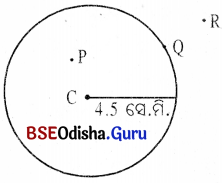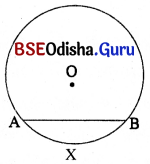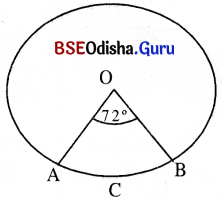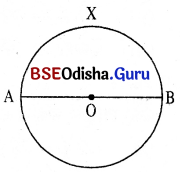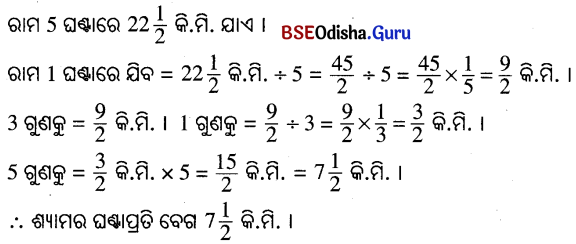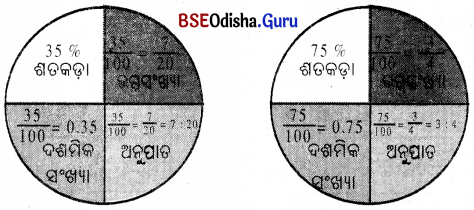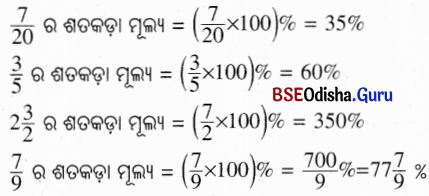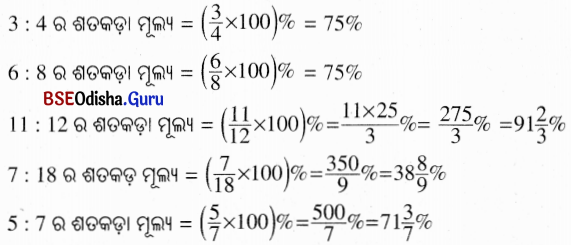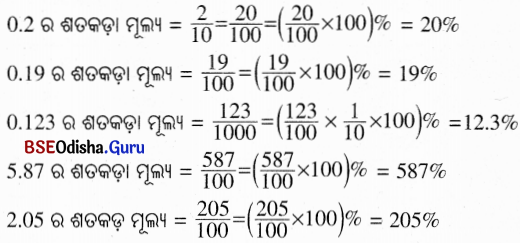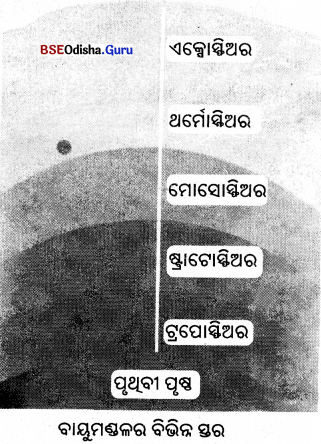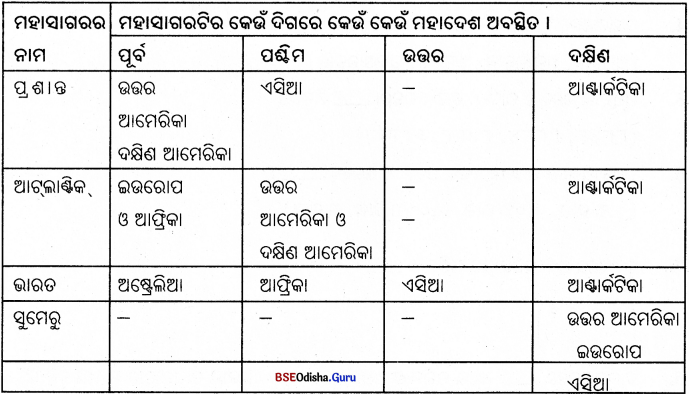Odisha State Board BSE Odisha 9th Class Odia Solutions Chapter 1 କାହା ମୁଖ ଅନାଇ ବଞ୍ଚିବି Textbook Exercise Questions and Answers.
BSE Odisha Class 9 Odia Solutions Chapter 1 କାହା ମୁଖ ଅନାଇ ବଞ୍ଚିବି
ପାଠ୍ୟପୁସ୍ତକସ୍ଥ ପ୍ରଶ୍ନାବଳୀର ଉତ୍ତର
ସଂକ୍ଷିପ୍ତ ଉତ୍ତରମୂ ଳକ ପ୍ରଶ୍ନୋତ୍ତର
୧। ନିମ୍ନୋକ୍ତ ଉକ୍ତି ମଧ୍ୟରୁ ଯେଉଁଗୁଡ଼ିକ ଠିକ୍ ତାହା ଲେଖ।
(କ) ‘ଜୀବନ’ ଅଭାବରେ ମାଛ ବଞ୍ଚିପାରେ।
(ଖ) କୃଷ୍ଣ ତାଙ୍କ ପିତାଙ୍କୁ ଚନ୍ଦ୍ର ଆଣିଦେବାପାଇଁ ଅଳି କରୁଥିଲେ।
(ଗ) ଯଶୋଦା କୃଷ୍ଣଙ୍କୁ ମଥୁରାକୁ ଯିବାକୁ ବାରଣ କରୁଥିଲେ।
(ଘ) ଯଶୋଦା ପକ୍ଷରେ କୃଷ୍ଣ ବିଚ୍ଛେଦ ଅସହ୍ୟ ଥିଲା।
(ଙ) କୃଷ୍ଣ ପିଲାଦିନେ କାହାକୁ ଡରୁ ନ ଥିଲେ।
(ଚ) କୃଷ୍ଣ ରାଗିଗଲେ ରନ୍ଧାହାଣ୍ଡି ଭାଙ୍ଗି ଦେଉଥିଲେ।
(ଛ) କୃଷ୍ଣ ଉଚ୍ଚ ପାହାଚ ଚଢ଼ିପାରୁ ନ ଥିଲେ।
Answer:
ନିମ୍ନୋକ୍ତ ଉକ୍ତିଗୁଡ଼ିକ ଠିକ୍।
(ଖ) କୃଷ୍ଣ ତାଙ୍କ ପିତାଙ୍କୁ ଚନ୍ଦ୍ର ଆଣିଦେବାପାଇଁ ଅଳି କରୁଥିଲେ।
(ଗ) ଯଶୋଦା କୃଷ୍ଣଙ୍କୁ ମଥୁରାକୁ ଯିବାକୁ ବାରଣ କରୁଥିଲେ।
(ଘ) ଯଶୋଦା ପକ୍ଷରେ କୃଷ୍ଣ ବିଚ୍ଛେଦ ଅସହ୍ୟ ଥିଲା।
(ଚ) କୃଷ୍ଣ ରାଗିଗଲେ ରନ୍ଧାହାଣ୍ଡି ଭାଙ୍ଗି ଦେଉଥିଲେ।
(ଛ) କୃଷ୍ଣ ଉଚ୍ଚ ପାହାଚ ଚଢ଼ିପାରୁ ନ ଥିଲେ।

୨। ପଠିତାଂଶରୁ ଶବ୍ଦ ବାଛି ଶୂନ୍ୟସ୍ଥାନ ପୂରଣ କର।
(କ) ମା’ ପୁଅ ଆଖ୍ୟାରେ __________ ଲଗାଇଲେ।
Answer:
ଅଞ୍ଜନ
(ଖ) ମୋ କଥାକୁ ସେ ________ ଗ୍ରହଣ କଲା ନାହିଁ ।
Answer:
ତିଳେହେଲେ
(ଗ) ଗରିବଟିର _________ କେହି ନାହାନ୍ତି ।
Answer:
ସାହା
ଘ) ସନ୍ୟାସୀଙ୍କ _____________ ମଣ୍ଡଳରେ ଅପୂର୍ବ ଜ୍ୟୋତି ପ୍ରକାଶିତ।
Answer:
ମୁଖ
(ଙ) ମୋ ସହିତ ମୋ ___________ ସବୁଆଡ଼େ ଯାଏ।
Answer:
ଛାଇ।

୩। ନିମ୍ନଲିଖ୍ ଶବ୍ଦଗୁଡ଼ିକର ଗଦ୍ୟରୂପ ଲେଖ।
ଅଥର, ସୁମରି, ସ୍ବପନ, ଯେହ୍ନେ
Answer:
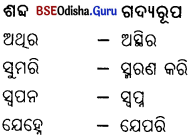
୪। ନିମ୍ନଲିଖ୍ ଶବ୍ଦଗୁଡ଼ିକୁ ଭିନ୍ନ ଭିନ୍ନ ଅର୍ଥ ପ୍ରକାଶ କରୁଥିବା ବାକ୍ୟରେ ବ୍ୟବହାର କର।
ଜୀବନ, ଚିତା, ହରି, ବାଳ, ନିଶା
Answer:
- ଜୀବନ – ( ପ୍ରାଣ ) ଆପଣା ଜୀବନ ବଞ୍ଚାଇବା କୌଶଳ ସବୁ ପ୍ରାଣୀଙ୍କୁ ଜଣା ଅଛି।
(ଜଳ) ଜୀବନ ବିନା ମାଛ ବଞ୍ଚିପାରେ ନାହିଁ।
- ଚିତା – (ଚିତ୍ର) ଆଗକାଳରେ ଲୋକମାନେ ଦେହରେ ଚିତା କୁଟାଉଥିଲେ।
( ଜୁଇ) ପ୍ରାକ୍-ସ୍ଵାଧୀନତା କାଳରେ ସ୍ତ୍ରୀକୁ ସ୍ଵାମୀ ଚିତା ଅଗ୍ନିରେ ଝାସ ଦେବାକୁ ପଡୁଥିଲା।
ବୈଷ୍ଣବମାନେ କପାଳରେ ଚିତା ଲଗାଇ ଥାଆନ୍ତି।
- ଦ୍ରରି — (ଭଗବାନ) ବିପଦ କାଳରେ ହରିଙ୍କୁ ସ୍ମରଣ କରି ଭକ୍ତ ଉଦ୍ଧାର ପାଏ।
(ଚୋରି କରି) ପଞ୍ଚବଟୀ କୁଟୀରରୁ ରାବଣ ସୀତାଙ୍କୁ ହରି ନେଇଥିଲା।
ଶ୍ରୀକୃଷ୍ଣ ପିତା ନନ୍ଦରାଜାଙ୍କୁ ହରି ଆଣିଦେବାକୁ ଅଳି କରୁଥିଲେ।
- ବାଳ – (କେଶ ) ମୁଣ୍ଡରେ ଅଧିକ ବାଳ ନ ରଖିବାକୁ ଶିକ୍ଷକ କହିଲେ।
(ବାଳକ) ବାଳ, ବୃଦ୍ଧଙ୍କୁ ହତାଦର କରିବା ଉଚିତ ନୁହେଁ।
- ନିଶା। – (ମାଦକ ଦ୍ରବ୍ୟ) ନିଶା ସେବନ ସ୍ୱାସ୍ଥ୍ୟ ପକ୍ଷେ ଅହିତକର।
(ରାତ୍ରି) ନିଶା କାଳରେ ଦବନ ନିଷିଦ୍ଧ ଅଟେ।

୫। ନିମ୍ନ ଶବ୍ଦଗୁଡ଼ିକର ଅର୍ଥଗତ ପ୍ରଭେଦ ଦର୍ଶାଅ।
ସର-ଶର, ସୁଧା-ସୁଦ୍ଧା, ସମ-ଶମ
Answer:
ସର – ପୋଖରୀ, କ୍ଷୀର ଜାତ ସୁସ୍ବାଦୁ ଖାଦ୍ୟ।
ଶର – ଧନୁର ତୀର, ବାଣ।
ସୁଧା – ଅମୃତ।
ସୁଦ୍ଧା – ତଥାପି।
ସମ – ସମାନ
ଶମ – ଶାନ୍ତି, ସଂଯମ।
୬। ନିମ୍ନ ଶବ୍ଦଗୁଡ଼ିକର ଦୁଇଟି ଲେଖାଏଁ ପ୍ରତିଶବ୍ଦ ଲେଖ।
ରାଜା, ନିଶି, ବସ୍ତ୍ର, ଅଙ୍ଗ, ବନ
Answer:
ଶବ୍ଦ – ପ୍ରତିଶବ୍ଦ
ରାଜା – ନୃପତି, ଭୂପତି, ଅଧୂପତି, ନରେଶ
ବସ୍ତ୍ର – ପୋଷାକ, ଲୁଗା, ବସନ
ବନ – ବିପିନ, ବନସ୍ତ, ଅରଣ୍ୟ
ନିଶି – ରାତ୍ରି, ଶର୍ବରୀ, ଯାମିନୀ
ଅଙ୍ଗ – ଅଂଶ, ଅବୟବ

୭। ନିମ୍ନଲିଖତ ଶବ୍ଦଗୁଡ଼ିକର ବ୍ୟାସବାକ୍ୟ ସହ ସମାସର ନାମ ଲେଖ।
ଶ୍ୟାମଘନ, ଦଶଦିଗ, ଚନ୍ଦ୍ରମୁଖ, ପାକଭାଣ୍ଡ
Answer:
ଶ୍ୟାମଘନ – ଘନ ପରି ଶ୍ୟାମ – ଉପମାନ କର୍ମଧାରୟ ସମାସ
ଦଶ ଦିଗ – ଦଶ ଦିଗର ସମାହାର – ଦ୍ବିଗୁ ସମାସ
ଚନ୍ଦ୍ରମୁଖ – ଚନ୍ଦ୍ର ପରି ମୁଖ ଯାହାର – ଉପମିତ ବହୁବ୍ରୀହି ସମାସ
ପାକଭାଣ୍ଡ – ପାକ ନିମିତ୍ତ/ପାଇଁ ଭାଣ୍ଡ – ଚତୁର୍ଥୀ ତତ୍ତ୍ଵପୁରୁଷ ସମାସ
୮ । ନିମ୍ନଲିଖତ ଶବ୍ଦଗୁଡ଼ିକର ବିପରୀତ ଶବ୍ଦ ଲେଖ।
ଶୂନ୍ୟ, ନିଦ୍ରା, ବାନ୍ଧିବା, ବିଚ୍ଛେଦ, ଅନ୍ଧାର
Answer:
ଶବ୍ଦ – ପ୍ରତିଶବ୍ଦ
ଶୂନ୍ୟ – ପୁଣ୍ଡ
ନିଦ୍ରା – ଜାଗ୍ରତ | ଅନିଦ୍ରା
ବାନ୍ଧିବା – ଖୋଲିବା | ଫିଟାଇବା
ବିଚ୍ଛେଦ – ମିଲନ
ଅନ୍ଧାର – ଅ।ଲେ।କ

୯। ‘କ’ ସ୍ତମ୍ଭର ଶବ୍ଦ ସହିତ ‘ଖ’ ସ୍ତମ୍ଭର ଉପଯୁକ୍ତ ଶବ୍ଦ ଯୋଗକରି ବାକ୍ୟ ଗଠନ କର।
‘କ’ ସ୍ତମ୍ଭ – ‘ଖ’ସ୍ତମ୍ଭ
Answer:
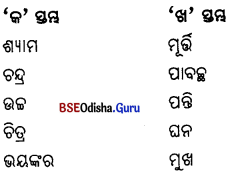
- ‘ଶ୍ୟାମଘନ – ଶ୍ରୀକୃଷ୍ଣଙ୍କୁ ଶ୍ୟାମଘନ ବୋଲି କୁହାଯାଏ।
- ଚତ୍ରମୂଖ – ମାତା ଯଶୋଦା ପୁତ୍ର କୃଷ୍ଣଙ୍କ ଚନ୍ଦ୍ରମୁଖ ଦର୍ଶନରେ ଜୀବନର ସବୁ ଦୁଃଖ ଭୁଲିଯାଉଥିଲେ।
- ଉଚ୍ଚ ପାବଚ୍ଛ – କପିଳାସର ଉଚ୍ଚ ପାବଚ୍ଛଶ୍ରେଣୀ ଆରୋହଣ ନିଶ୍ଚିତ ଭାବେ କଷ୍ଟସାଧ୍ୟ।
- ଚିତ୍ରପନ୍ତି – ମନ୍ଦିରର ବାହାର କାନ୍ଥରେ ନାନାଦି ପୌରାଣିକ ତଥ୍ୟ ସମ୍ବଳିତ ଚିତ୍ରପନ୍ତ ଅଙ୍କିତ ହୋଇଥାଏ।
- ଭୟଙ୍କର ମୂର୍ତ୍ତି – ମଣ୍ଡପରେ ଚିତ୍ରକର ରାକ୍ଷସର ଏକ ଭୟଙ୍କର ମୂର୍ତ୍ତି ନିର୍ମାଣ କରିଛନ୍ତି।

କ୍ଷୁଦ୍ର ଉତ୍ତରମୂଳକ ପ୍ରଶ୍ନୋତ୍ତର
୧୦। ‘ଶ୍ୟାମଘନ’ ବୋଲି କିଏ, କାହାକୁ ସମ୍ବୋଧନ କରିଛନ୍ତି ?
Answer:
‘ଶ୍ୟାମଘନ’ ବୋଲି ମାତା ଯଶୋଦା ତାଙ୍କ ପୁତ୍ର ଶ୍ରୀକୃଷ୍ଣଙ୍କୁ ସମ୍ବୋଧନ କରିଛନ୍ତି।
୧୧। ‘ଜୀବନ’ ବିନା ‘ଝଷ’ର କ’ଣ ହୁଏ ?
Answer:
‘ଜୀବନ’ ଅର୍ଥାତ୍ ଜଳ ବିନା ‘ଝଷ’ ଅର୍ଥାତ୍ ମାଛର ଜୀବନ ଧାରଣ ସମ୍ଭବ ନୁହେଁ।
୧୨ । ରାଜାଙ୍କ ବିନା ରାଜ୍ୟର ଅବସ୍ଥା କ’ଣ ହୁଏ ?
Answer:
ରାଜାଙ୍କ ବିନା ରାଜ୍ୟର ଶାସନ ବ୍ୟବସ୍ଥା ବିପର୍ଯ୍ୟସ୍ତ ହେବା ସହ ଅପରାଧୀଙ୍କ ଉପଦ୍ରବ ତଥା ଶତ୍ରୁ ଆକ୍ରମଣରେ ରାଜ୍ୟ ଛାରଖାର ହୋଇଯାଏ।
୧୩ । କୃଷ୍ଣଙ୍କ ଅନୁପସ୍ଥିତିରେ ନିଜର ଜୀବନ କାହା ଭଳି ହେବ ବୋଲି ଯଶୋଦା ଆଶଙ୍କା କରିଛନ୍ତି ?
Answer:
କୃଷ୍ଣଙ୍କ ଅନୁପସ୍ଥିତିରେ ନିଜର ଜୀବନ ଜଳ ବିନା ମାଛ ତଥା ରାଜା ବିନା ଦେଶର ଅବସ୍ଥା ପରି ହେବ ବୋଲି ଯଶୋଦା ଆଶଙ୍କା କରିଛନ୍ତି।
୧୪। କୃଷ୍ଣ ତାଙ୍କ ପିତାଙ୍କୁ କ’ଣ ମାଗନ୍ତି ?
Answer:
ବାଳକ କୃଷ୍ଣ ତାଙ୍କ ପିତାଙ୍କୁ ଅଳିକରି ଆକାଶର ଚାନ୍ଦ ମାଗନ୍ତି।
୧୫ । ଯଶୋଦା କୃଷ୍ଣଙ୍କ ଶରୀରରେ କ’ଣ ଲେପନ କରୁଥିଲେ ?
Answer:
ଯଶୋଦା କୃଷ୍ଣଙ୍କ ଶରୀରରେ ଅଗୁରୁ, ଚନ୍ଦନ, କସ୍ତୁରୀ ଓ କୁଙ୍କୁମ ଲେପନ କରୁଥିଲେ।

୧୬ । ଯଶୋଦା କୃଷ୍ଣଙ୍କ ମସ୍ତକକୁ କିପରି ବେଶ କରୁଥିଲେ ?
Answer:
ଯଶୋଦା କୃଷ୍ଣଙ୍କ ଘନ କେଶରାଜିକୁ ସୁନ୍ଦରଭାବେ ବାନ୍ଧି ତହିଁରେ ପୁଷ୍ପ ମଣ୍ଡନ କରିବା ସହ ଲଲାଟରେ ଚନ୍ଦନର ଚିତା ଲଗାଉଥିଲେ।
୧୭ । କୃଷ୍ଣଙ୍କ କାନରେ କ’ଣ ଶୋଭାପାଏ ?
Answer:
କୃଷ୍ଣଙ୍କ କର୍ଣ୍ଣଯୁଗଳରେ କୁଣ୍ଡଳ ଶୋଭାପାଏ।
୧୮। କୃଷ୍ଣ ବନକୁ ଗଲେ ଯଶୋଦାଙ୍କ ମନରେ କି ଅନୁଭୂତି ସୃଷ୍ଟି ହୁଏ ?
Answer:
କୃଷ୍ଣ ବନକୁ ଗଲାପରେ ତାଙ୍କ ବିଚ୍ଛେଦକୁ ସହି ନ ପାରି ସତେ ଯେପରି କୃଷ୍ଣ ତାଙ୍କ ପ୍ରାଣକୁ ସଙ୍ଗରେ ନେଇଯାଇଥିବା ପରି ଯଶୋଦା ଅନୁଭବ କରନ୍ତି ।
୧୯ । କୃଷ୍ଣଙ୍କ ଅନୁପସ୍ଥିତିରେ ଯଶୋଦା କ’ଣ କରିବେ ବୋଲି କହିଛନ୍ତି ?
Answer:
କୃଷ୍ଣଙ୍କ ଅନୁପସ୍ଥିତିରେ ପୁତ୍ର ବିରହ ସହି ନ ପାରି ଯଶୋଦା ଗଭୀର ଜଳରେ ଆତ୍ମ ବିସର୍ଜନ କରିବେ ବୋଲି କହିଛନ୍ତି ।
୨୦। ଯଶୋଦା କୃଷ୍ଣଙ୍କୁ କ’ଣ କ’ଣ ଖାଇବାକୁ ଦିଅନ୍ତି ?
Answer:
ଯଶୋଦା କୃଷ୍ଣଙ୍କୁ ଅମୃତତୁଲ୍ୟ ସର, ଲବଣି, ରାବିଡ଼ି ଓ ପାଚିଲା କଦଳୀ ଖାଇବାକୁ ଦିଅନ୍ତି।
୨୧। କୃଷ୍ଣଙ୍କୁ ସୁସ୍ୱାଦୁ ଖାଦ୍ୟ ରୁଚେ ନାହିଁ ବୋଲି କବିତାର ଯେଉଁ ପଂକ୍ତିରୁ ଜଣାପଡ଼ୁଛି ତାହା ଲେଖ।
Answer:
ସର ଲବଣୀ ଅଧାମ ପକ୍ଵ ରମ୍ଭା ସୁଧା ସମ ମୁଖେ ଦେଲେ ଥୁ ଥୁ କରି ଫିଙ୍ଗୁ।
୨୨। କୃଷ୍ଣ ରାଗିଗଲେ କ’ଣ କରୁଥିଲେ ?
Answer:
କୃଷ୍ଣ ରାଗିଗଲେ ପାକହାଣ୍ଡି ଭାଙ୍ଗୁଥିଲେ।
୨୩। କୃଷ୍ଣ ଡରିଗଲେ କ’ଣ କରୁଥିଲେ ?
Answer:
କୃଷ୍ଣ ଡରିଗଲେ ଧାଇଁଯାଇ ମା’ଙ୍କୁ କୁଣ୍ଢାଇ ଧରି ତାଙ୍କ ପିନ୍ଧା ବସନରେ ନିଜ ମୁଖକୁ ଘୋଡ଼ାଇ ଦେଉଥିଲେ।

୨୪। କୃଷ୍ଣ କାହାକୁ ଦେଖୁ ଭୟ କରୁଥିଲେ ?
Answer:
କୃଷ୍ଣ ଛାଇକୁ ଦେଖ୍ ତଥା ଅନ୍ଧାରଘର ଓ କାନ୍ଥରେ ଥିବା ଭୟଙ୍କର ମୂର୍ତ୍ତି ତଥା ଚିତ୍ରପନ୍ତକୁ ଦେଖ୍ ଡରୁଥିଲେ।
୨୫। କୃଷ୍ଣ ମଥୁରାରେ କ’ଣ ଶୁଣି ଅଧ୍ଵ ଭୟଭୀତ ହୋଇପଡ଼ିବେ ବୋଲି ଯଶୋଦା ଆଶଙ୍କା ପ୍ରକାଶ କରିଛନ୍ତି ?
Answer:
ମଥୁରାରେ ହାତୀ ଓ ଘୋଡ଼ାମାନଙ୍କର ଗର୍ଜନ ଶୁଣି କୃଷ୍ଣ ଅଧ୍ଵ ଭୟଭୀତ ହୋଇପଡ଼ିବେ ବୋଲି ଯଶୋଦା ଆଶଙ୍କା କରିଛନ୍ତି।
୨୬। କୃଷ୍ଣ ଉଚ୍ଚ ପାହାଚ ଉଠିପାରନ୍ତି ନାହିଁ ବୋଲି ଯଶୋଦା କାହିଁକି କହିଛନ୍ତି ?
Answer:
କୃଷ୍ଣ ଭୟାଳୁ ଥିବାରୁ ଉଚ୍ଚ ପାହାଡ଼ ଉଠିପାରନ୍ତି ନାହିଁ ବୋଲି ଯଶୋଦା କହିଛନ୍ତି।
୨୭। କାନ୍ଥରେ ଭୟଙ୍କର ମୂର୍ତ୍ତିର ଚିତ୍ର ଦେଖ୍ କୃଷ୍ଣ କ’ଣ କରୁଥିଲେ ?
Answer:
କାନ୍ଥରେ ଭୟଙ୍କର ମୂର୍ତ୍ତିର ଚିତ୍ର ଦେଖ୍ କୃଷ୍ଣ ସଙ୍ଗେ ସଙ୍ଗେ ସେ ଘରୁ ବାହାରି ଆସୁଥିଲେ।
୨୮। କୃଷ୍ଣ କ୍ଳାନ୍ତ ହୋଇ କେଉଁଠି ଶୋଇଯାଉଥିଲେ ?
Answer:
କୃଷ୍ଣ କ୍ଳାନ୍ତ ହୋଇ ମାଆଙ୍କ କୋଳରେ ଶୋଇଯାଉଥିଲେ।
୨୯। କୃଷ୍ଣ ଶୋଇଥିଲାବେଳେ କାହିଁକି ଚମକି ଉଠୁଥିଲେ ବୋଲି ଯଶୋଦା କହିଛନ୍ତି ?
Answer:
କୃଷ୍ଣ ଶୋଇବାବେଳେ ନିଦରେ ଭୟଙ୍କର ସ୍ଵପ୍ନ ଦେଖି ଚମକି ପଡୁଥିଲେ।
୩୦। କୃଷ୍ଣ ଚମକି ପଢ଼ି କ’ଣ କରୁଥିଲେ ?
Answer:
କୃଷ୍ଣ ଭୟରେ ଚମକି ପଡ଼ି ମାତା ଯଶୋଦାଙ୍କ କଣ୍ଠରେ ଦୁଇ ହାତକୁ ଛନ୍ଦି ଲୁଗା ଘୋଡ଼ି ହୋଇ ଶୋଇଯାଉଥିଲେ।

ସପ୍ରସଙ୍ଗ ସରଳାର୍ଥ ଲେଖ
୩୧। ଜୀବନ ବିହୁନେ ଯେହ୍ନେ ଝଷ
ରାଜା ବିନେ ଯେହ୍ନେ ଗ୍ରାମ ଦେଶ।
Answer:
ଛାଇକି ଅନାଇ ଡରୁ……………… ଗ୍ରାମଦେଶ।
ଶଂସିତ ପଦ୍ୟାଶଟି ଭକ୍ତଚରଣ ଦାସଙ୍କ ବିରଚିତ ‘ ମଥୁରା ମଙ୍ଗଳ କାବ୍ଯାନ୍ତର୍ଗତ ଷଷ୍ଠ ଛାନ୍ଦରୁ ସଂଗୃହୀତ ‘କାହା ମୁଖ
ଅନାଇ ବଞ୍ଚିବି’ ଶୀର୍ଷକ ପଦ୍ୟରୁ ଆନୀତ।
ଶଂସିତ ପଦ୍ୟାଶଟି ଭକ୍ତଚରଣ ଦାସଙ୍କ ବିରଚିତ ‘ ମଥୁରା ମଙ୍ଗଳ କାବ୍ଯାନ୍ତର୍ଗତ ଷଷ୍ଠ ଛାନ୍ଦରୁ ସଂଗୃହୀତ ‘କାହା ମୁଖ ଅନାଇ ବଞ୍ଚିବି’ ଶୀର୍ଷକ ପଦ୍ୟରୁ ଆନୀତ।
ଏଠାରେ କବି କୃଷ୍ଣଙ୍କ ବିନା ଯଶୋଦାଙ୍କ ମନରେ ସୃଷ୍ଟ ଅନାଗତ ଆଶଙ୍କା ଉପରେ ଆଲୋକପାତ କରିଛନ୍ତି । ମଥୁରାରେ ଆୟୋଜିତ ଧନୁଉତ୍ସବ ଦର୍ଶନ କରିବାକୁ କଂସର ନିମନ୍ତ୍ରଣ ଚିଟାଉ ଅକୁରଠାରୁ ପାଇବା ପରେ ଗୋପପୁରରେ ହାହାକାର ପଡ଼ିଯାଇଛି । ଶ୍ରୀକୃଷ୍ଣ ମଥୁରା ଯିବାପାଇଁ ସମ୍ମତି ପ୍ରଦାନ କଲାପରେ ଯଶୋଦାଙ୍କ ମାତୃହୃଦୟ ବ୍ୟାକୁଳ ହୋଇଉଠିଛି। ମାତୃହୃଦୟର ଗଭୀର ବାତ୍ସଲ୍ୟ ମମତାର ଚିତ୍ର କବିଙ୍କ ଲେଖନୀ ମୁନରେ ଜୀବନ୍ତ ହୋଇଉଠିଛି ।
କୃଷ୍ଣଙ୍କୁ ଦଣ୍ଡେ ନ ଦେଖି ମାତା ଯଶୋଦା ବ୍ୟର୍ଥିତ ହୋଇ ପଡ଼ନ୍ତି । କୃଷ୍ଣ ମଥୁରାପୁର ଯାତ୍ରା କଲାପରେ ସେ କିପରି କାଳାତିପାତ କରିବେ ତାହା ଚିନ୍ତା କରି ତାଙ୍କ ପ୍ରାଣ ବିଷାଦରେ ଭରି ଉଠିଛି । ପୁତ୍ର ବିନା ଦେହଧାରଣ କରି ବଞ୍ଚିବା ଯେ ତାଙ୍କ ପକ୍ଷେ ସମ୍ଭବ ହେବ ନାହିଁ, ଏହା ସେ ସ୍ପଷ୍ଟ ଭାବେ ପ୍ରକାଶ କରିଛନ୍ତି । ଜଳ ବିନା ମତ୍ସ୍ୟ ଯେପରି ବଞ୍ଚିବା ଅସମ୍ଭବ ଏବଂ ରାଜା ବିନା ରାଜ୍ୟର ଅବସ୍ଥା ଯେଭଳି ଭାବେ ବିପର୍ଯ୍ୟୟ ଅଭିମୁଖୀ ହୋଇଥାଏ, ଠିକ୍ ସେହିପରି କୃଷ୍ଣଙ୍କ ବିଚ୍ଛେଦରେ ଯଶୋଦା
ପ୍ରାଣଧାରଣ କରିବା ଅସମ୍ଭବ ହୋଇଉଠିବ। ମାନସିକ ଭାରସାମ୍ୟ ହରାଇ ସେ ହୁଏତ ମୃତ୍ୟୁବରଣ କରିବେ ଏହି ଆଶଙ୍କାରେ ତାଙ୍କ ହୃଦୟ ଦଗ୍ଧଭୂତ ହୋଇଉଠିଛି। ସ୍ନେହମୟୀ ଜନନୀଙ୍କ କୋମଳ ମନ ବିଳପି ଉଠିଛି। ତାଙ୍କ ମନୋଭାବନାର ଏକ ନିଚ୍ଛକ ଚିତ୍ର କବି କଳ୍ପନାରେ ମନୋଜ୍ଞ ହୋଇଉଠିଛି।

୩୨। ଯେତେବେଳେ ବନେ ଯାଉ ସଙ୍ଗରେ ମୋ ପ୍ରାଣ ନେଉ
ନିମିଷେ ବିଚ୍ଛେଦ ନ ସହଇ ।
Answer:
ଯେତେବେଳେ ……… ନ ସହଇ ।
ପ୍ରଦତ୍ତ ପଦ୍ୟାଶଟି ଭକ୍ତଚରଣ ଦାସଙ୍କ ବିରଚିତ ‘ମଥୁରା ମଙ୍ଗଳ କାବ୍ଯାନ୍ତର୍ଗତ ଷଷ୍ଠ ଛାନ୍ଦରୁ ସଂଗୃହୀତ ‘କାହା ମୁଖ ଅନାଇ ବଞ୍ଚିବି ’ ଶୀର୍ଷକ ପଦ୍ୟରୁ ଆନୀତ। ଏଠାରେ କବି ଶ୍ରୀକୃଷ୍ଣଙ୍କ ଗୋଚାରଣ ଉଦ୍ଦେଶ୍ୟରେ ବନଗମନ ପରିପ୍ରେକ୍ଷୀରେ ମାତା ଯଶୋଦାଙ୍କ ମନର ଭାବାନ୍ତର ବର୍ଣ୍ଣନା କରିଛନ୍ତି। ଗୋପାଳ ବାଳକମାନଙ୍କ ସହ ଶ୍ରୀକୃଷ୍ଣ ବନ ମଧ୍ୟକୁ ଗୋଚାରଣ ନିମନ୍ତେ ଯାଉଥିଲେ। ଅନିଚ୍ଛା ସତ୍ତ୍ଵେ ପୁତ୍ରର ଇଚ୍ଛାକୁ ବିରୋଧ କରିପାରୁ ନ ଥିଲେ ସେ। କିନ୍ତୁ ଏକୋଇର ବଳା, ପୁତ୍ର ଶ୍ରୀକୃଷ୍ଣ ତାଙ୍କ ପାଇଁ ନୟନପିତୁଳା ପ୍ରାୟ ଥିଲେ। ଜୀବନସଙ୍ଖାଳି ପୁତ୍ରକୁ ଦଣ୍ଡେ ଛାଡ଼ି ରହିବା ତାଙ୍କୁ ଅସହ୍ୟ ବୋଧ ହେଉଥିଲା । ବନ ମଧ୍ୟରେ ପୁତ୍ର ପ୍ରତି ଅହେତୁକ ବିପଦ ଆଶଙ୍କା କରି ତାଙ୍କ ମନ ଅଥୟ ହୋଇ ଉଠୁଥିଲା। ପୁତ୍ର ବିରହରେ ସାରାଦିନ ଗୃହରେ କେବଳ ଯନ୍ତ୍ରବତ୍ ଚଳପ୍ରଚଳ ହେଉଥିଲେ ସେ। ପୁତ୍ରର କ୍ଷଣିକ ବିଚ୍ଛେଦ ତାଙ୍କୁ କୋଟି ଯୁଗ ପ୍ରାୟ ଅନୁଭୂତ ହେଉଥିଲା। କାରଣ କୃଷ୍ଣ ତାଙ୍କ ପାଇଁ ଥିଲେ ଅନ୍ଧର ଲଉଡ଼ି ସଦୃଶ। କୃଷ୍ଣ ବନରୁ ବାହୁଡ଼ିବା ପର୍ଯ୍ୟନ୍ତ ସେ ନିଜକୁ ପ୍ରାଣହୀନ ପ୍ରାୟ ଅନୁଭବ କରୁଥିଲେ। ପଦ୍ୟାଶଟିରେ ମାତୃହୃଦୟର ଗଭୀର ବାତ୍ସଲ୍ୟ ମମତା ପ୍ରକଟିତ ହୋଇଛି।
୩୩। ସରଲବଣୀ ଅଧାମ ପକ୍ଵରମ୍ଭା ସୁଧା ସମ
ମୁଖେ ଦେଲେ ଥୁ ଥୁ କରି ଫିଲ୍ମ।
Answer:
ସରଲବଣୀ……………. କରି ଫିଙ୍ଗୁ।
ଶଂସିତ ପଦ୍ୟାଶଟି ପକ୍ଵରମ୍ଭାଦାସଙ୍କ ବିରଚିତ ‘ ମଥୁରା ମଙ୍ଗଳ କାବ୍ଯାନ୍ତର୍ଗତ ଷଷ୍ଠ ଛାନ୍ଦରୁ ସଂଗୃହୀତ
‘କାହା ମୁଖ ଅନାଇ ବଞ୍ଚି’ ଶୀର୍ଷକ କବିତାରୁ ଆନୀତ।
ଏଠାରେ କବି ଶ୍ରୀକୃଷ୍ଣଙ୍କ ଖାଦ୍ୟରୁଚି ସମ୍ପର୍କରେ ଆଲୋକପାତ କରିଛନ୍ତି।
ସାଧାରଣତଃ ପୁଅ ପାଇଁ ମା’ର ମନ ସଦା ବ୍ୟାକୁଳିତ ଥାଏ। ସନ୍ତାନର ମନ ଜାଣି ସେ ରୁଚିକର ଖାଦ୍ୟପଦାର୍ଥମାନ ତା’ପାଇଁ ସଜାଡ଼ି ରଖୁଥାଏ। ସ୍ନେହମୟୀ ମା’ ଯଶୋଦା ପୁତ୍ର ଶ୍ରୀକୃଷ୍ଣଙ୍କ ପାଇଁ କ୍ଷୀରସର, ରାବିଡ଼ି ଓ ଲବଣୀ ପରି ଦୁଗ୍ଧଜାତ ସୁସ୍ୱାଦୁ ଖାଦ୍ୟପଦାର୍ଥ ଏବଂ ଅମୃତ ସମ ପାଚିଲା କଦଳୀ ଆଦି ପୁଷ୍ଟିକର ଦ୍ରବ୍ୟ ସାଇତି ରଖୁଥାଆନ୍ତି। କିନ୍ତୁ ସେସବୁ ପଦାର୍ଥ ଶ୍ରୀକୃଷ୍ଣଙ୍କ ପାଇଁ ଥିଲା ଅରୁଚିକର। ଯେତେ ଆଦରରେ ମାଆ ତାଙ୍କୁ ଏ ସମସ୍ତ ଖୁଆଇଦେଲେ ମଧ୍ୟ କୃଷ୍ଣ ସେସବୁକୁ ଥୁ ଥୁ କରି ଫିଙ୍ଗି ଦେଉଥିଲେ। ମା’ ଯଶୋଦା ଏହା ଲକ୍ଷ୍ୟ କରି ବ୍ୟସ୍ତ ହୋଇ ଉଠୁଥିଲେ। କୃଷ୍ଣ ମଥୁରା ଚାଲିଗଲେ ସେଠାରେ କିଏ ତାଙ୍କ ମନ ଜାଣି ଖାଦ୍ୟ ଖୋଇଦେବ, ଏହା ଚିନ୍ତା କରି ମା’ ଯଶୋଦା ବିବ୍ରତ ହୋଇପଡ଼ିଛନ୍ତି। ମମତାମୟୀ ଜନନୀ ପ୍ରାଣର ବାତ୍ସଲ୍ୟ ମମତା ଏଠାରେ ସ୍ପଷ୍ଟ ପ୍ରତିଭାତ ହୋଇଛି।
୩୪। ଛାଇକି ଅନାଇ ଡରୁ ଧାଇଁ ମୋତେ କୋଳ କରୁ
ବସନେ ଘୋଡ଼ାଇ ମୁଖ ଗୋଟି।
Answer:
ଛାଇକି ଅନାଇ ଡରୁ ……… ମୁଖ ଗୋଟି ।
ପ୍ରୋକ୍ତ ପଦ୍ୟାଶଟି ଭକ୍ତଚରଣ ଦାସଙ୍କ ରଚିତ ‘ମଥୁରା ମଙ୍ଗଳ କାବ୍ଯାନ୍ତର୍ଗତ ଷଷ୍ଠ ଛାନ୍ଦରୁ ସଂଗୃହୀତ ‘କାହା ମୁଖ ଅନାଇ ବଞ୍ଚିବି’ ଶୀର୍ଷକ ପଦ୍ୟରୁ ଆନୀତ।
ଏଠାରେ କବି ଶ୍ରୀକୃଷ୍ଣ ଶୈଶବରେ କିପରି ଭୟାତୁର ଥିଲେ ତାହା ବର୍ଣ୍ଣନା କରିଛନ୍ତି।

ବାଲ୍ୟକାଳରେ ଶ୍ରୀକୃଷ୍ଣ ଭୀଷଣ ଭୟାଳୁ ଥିଲେ । ତେଣୁ ମାତା ଯଶୋଦା ତାଙ୍କ ପାଇଁ ବ୍ୟସ୍ତ ହୋଇପଡୁଥିଲେ । ସେ ଏତେମାତ୍ରାରେ ଭୟାତୁର ଥିଲେ ଯେ ନିଜ ଛାଇକୁ ଦେଖୁ ଡରି ଯାଉଥିଲେ ଓ ଧାଇଁଯାଇ ମା’ଙ୍କୁ ଜାବୋଡ଼ି ଧରୁଥୁଲେ । ମା’ଙ୍କ ପିନ୍ଧା ବସନରେ ନିଜ ମୁହଁକୁ ଲୁଚାଇ ଦେଉଥିଲେ । ଯଶୋଦା ପୁଅକୁ କୋଳରେ ଭିଡ଼ିଧରି ତାଙ୍କ ମନରେ ସାହସ ସୃଷ୍ଟି କରିବାକୁ ଚେଷ୍ଟା କରୁଥିଲେ । ଏପରି ଭୟାଳୁ ପୁତ୍ର ମଥୁରା ନଗରୀରେ କିପରି ସମୟ ଅତିବାହିତ କରିବ ଏହି ଚିନ୍ତାରେ ଯଶୋଦା ବ୍ୟସ୍ତ ହୋଇଉଠି ଛନ୍ତି । କଂସ ରାଜପ୍ରାସାଦରେ ମହାବଳଶାଳୀ ହସ୍ତୀ, ଅଶ୍ଵ ଓ ରାକ୍ଷସମାନଙ୍କ ଉପସ୍ଥିତି ଲକ୍ଷ୍ୟ କରି ତାଙ୍କ ଆଦରର ପୁଅ ହୁଏତ ଭୟରେ ଶିହରି ଉଠିବ, ଏହା ଚିନ୍ତା କରି ମା’ ମନ ଆତଙ୍କିତ
ହୋଇପଛନ୍ତି।
୩୫। ମାଏ ବୋଲି ଡାକିବୁ କାହାକୁ
ସାହା ବା କେ ଆହା ବୋଲିବାକୁ ରେ।
Answer:
ମାଏ ବୋଲି ……….. ଆହା ବୋଲିବାକୁ ରେ।
ଶଂସିତ ପଦ୍ୟାଶଟି କବି ଭକ୍ତଚରଣ ଦାସଙ୍କ ରଚିତ ‘ମଥୁରା ମଙ୍ଗଳ କାବ୍ୟର ଷଷ୍ଠ ଛାନ୍ଦରୁ ସଂଗୃହୀତ ‘କାହା ମୁଖ ଅନାଇ ବଞ୍ଚିବି’ ଶୀର୍ଷକ ପଦ୍ୟରୁ ଉଦ୍ଧୃତ ।
ଏଠାରେ କବି ଶ୍ରୀକୃଷ୍ଣଙ୍କ ବିରହରେ ବ୍ୟଥ୍ତ ହୋଇ ସ୍ନେହମୟୀ ଯଶୋଦାଙ୍କର ମାତୃହୃଦୟର ବାତ୍ସଲ୍ୟ ମମତାର ଏକ ଜୀବନ୍ତ ଚିତ୍ର ପ୍ରଦାନ କରିଛନ୍ତି।
ମଥୁରାରେ ଧନୁଯାତ୍ରା ଦେଖିବାପାଇଁ ଶ୍ରୀକୃଷ୍ଣ ପ୍ରସ୍ତୁତ ହେବା ସମ୍ବାଦ ଶୁଣିଲା ପରେ ମା’ ଯଶୋଦା ବାତୁଳ ପ୍ରାୟ ବିଳାପ କରିଛନ୍ତି। କୃଷ୍ଣଙ୍କୁ ମୁହୂର୍ତ୍ତେ ଛାଡ଼ି ବଞ୍ଚିବା ଯାହା ପାଇଁ ଅଶେଷ ଯନ୍ତ୍ରଣାପ୍ରଦ ଥୁଲା, ସେହି ନୟନ-ପିତୁଳା, ଦୁଃଖୀ-ଧନକୁ ସୁଦୂର ମଥୁରାନଗରୀକୁ ପଠାଇ ସେ ବା କିପରି ଦେହଧାରଣ କରି ରହିପାରିବେ । ତାଙ୍କ ମାନସପଟରେ ପୁତ୍ରର ଶୈଶବ ଓ ବାଲ୍ୟଜୀବନର ସୁଖସ୍ଥ ତିଭରା ମୁହୂର୍ତ୍ତଗୁଡ଼ିକ ନାଚି ଉଠିଛି, ଯାହାକୁ ସ୍ମରଣ କରି ଯଶୋଦାଙ୍କ ଅନ୍ତର କାନ୍ଦି ଉଠିଛି । ତାଙ୍କର ଦୁର୍ବଳ ଶରୀର ବିଶିଷ୍ଟ ଭୟାଳୁ ପୁତ୍ର ରାକ୍ଷସପୁରୀରେ କିପରି ଦିନ ଅତିବାହିତ କରିବ, ସେହି ଚିନ୍ତାରେ ସେ ମ୍ରିୟମାଣ ହୋଇପଡ଼ିଛନ୍ତି । ଯେଉଁ ଅଲିଅଳ ପୁତ୍ର କାନ୍ଥରେ ଅଙ୍କିତ ଚିତ୍ରପନ୍ତିରେ ଏକ ଭୟଙ୍କର ଛବି ଦେଖିଲେ ଭୟରେ ଶିହରି ଉଠେ, ସ୍ବପ୍ନ ଦେଖ୍ ଚମକିଉଠେ ଏବଂ ମା’ଙ୍କୁ ଜାବୋଡ଼ି ଧରି ପଣତରେ ମୁହଁ ଢାଙ୍କିଦିଏ, ସେପରି ଭୟାଳୁ ସନ୍ତାନ ରାକ୍ଷସପୁରୀ ମଥୁରାରେ କିପରି ଦିନ କାଟିବ, ଏକଥା କଳ୍ପନା କରି ଆତଙ୍କିତ ହୋଇଛନ୍ତି ଯଶୋଦା। ସେଠାରେ ସାହା ହେବାପାଇଁ କି ଅଭୟ ଦେବାପାଇଁ କେହି ନ ଥିବେ। ଏହି ଆଶଙ୍କାରେ ଯଶୋଦା ବିଚଳିତ ହୋଇପଡ଼ିଛନ୍ତି।

ଦୀର୍ଘ ଉତ୍ତରମୂଳକ ପ୍ରଶ୍ନୋତ୍ତର
୩୬। ଯଶୋଦାଙ୍କ ମାତୃହୃଦୟର ମଧୁର ଅଭିବ୍ୟକ୍ତି କିପରି ପ୍ରକାଶିତ ହୋଇଛି ପଠିତ କବିତା ଅନୁସରଣରେ ଲେଖ ।
କିମ୍ବା, ମାତୃହୃଦୟର ବାତ୍ସଲ୍ୟ ମମତା ମାତା ଯଶୋଦାଙ୍କଠାରେ କିପରି ପରିପ୍ରକାଶ ଲାଭ କରିଛି, ତାହା ପଠିତ
କବିତା ଅବଲମ୍ବନରେ ନିଜ ଭାଷାରେ ବର୍ଣ୍ଣନା କର।
କିମ୍ବା, ‘କାହା ମୁଖ ଅନାଇ ବଞ୍ଚିବି’ ମାତୃ ହୃଦୟର ବାତ୍ସଲ୍ୟଧାରାର ଏକ ଜ୍ଵଳନ୍ତ ପ୍ରତୀକ – ପ୍ରତିପାଦନ କର।
Answer:
‘ ମନବୋଧ ଚଉତିଶା ପରି କାଳଜୟୀ କବିତାର ସ୍ରଷ୍ଟା ଭକ୍ତଚରଣ ଦାସ ଉତ୍କଳର ପୁରପଲ୍ଲୀରେ ଜଣେ ସୁପରିଚିତ ବ୍ୟକ୍ତିତ୍ଵ। ମଧ୍ୟଯୁଗୀୟ ଓଡ଼ିଆ କାବ୍ଯସାହିତ୍ୟରେ ଯେଉଁ କତିପୟ ସାରସ୍ଵତ ସାଧକ ସ୍ୱସୃଷ୍ଟିନିଚୟଦ୍ଵାରା ଯଶସ୍ବୀ ହୋଇଛନ୍ତି, ସେମାନଙ୍କ ମଧ୍ୟରେ ଭକ୍ତଚରଣ ଏକ ସ୍ବତନ୍ତ୍ର ସମ୍ମାନର ଅଧିକାରୀ। ଭକ୍ତଚରଣଙ୍କ ବୈଷ୍ଣବ ଶୁଦ୍ଧାଭକ୍ତି ଆଧାରିତ, ଭକ୍ତି ରସାଶ୍ରିତ ସାରସ୍ବତ ସୃଷ୍ଟିସମ୍ଭାର ମଧ୍ଯରେ ‘କଳାକଳେବର ଚଉତିଶା’, ‘ମନବୋଧ ଚଉତିଶା’, ‘ଗୋପ ମଙ୍ଗଳ, ‘ ମନଃ ଶିକ୍ଷା ଓ ମଥୁରା ମଙ୍ଗଳ ଆଦି କାବ୍ୟ କବିତାବଳୀ କବିଙ୍କ କୃଷ୍ଣଭକ୍ତି ଓ ଚେତନାର ପରିଚାୟକ । ଆଲୋଚ୍ୟ କବିତା ‘କାହୀ ମୁଖ ଅନାଇ ବଞ୍ଚିବି’ କବିଙ୍କର ଶ୍ରେଷ୍ଠ କାବ୍ୟ ‘ମଥୁରା ମଙ୍ଗଳ’ର ଷଷ୍ଠ ଛାନ୍ଦାନ୍ତର୍ଗତ ପ୍ରଥମ ଆଠଗୋଟି ପଦର ସମାହାର। କବିତାଟି ମାତୃହୃଦୟର ଗଭୀର ବାତ୍ସଲ୍ୟମମତା ଭରା ସ୍ଵଚ୍ଛଳ ମନ୍ଦାକିନୀଧାରା କହିଲେ ଅତ୍ୟୁକ୍ତି ହେବ ନାହିଁ। ଏତଦ୍ଭିନ୍ନ କବିତାଟିରେ କବିଙ୍କର କରୁଣ ରସାଶ୍ରିତ ବର୍ଣ୍ଣନା ଭରିଦେଇଛି ଅଫୁରନ୍ତ ପ୍ରାଣପ୍ରାଚୁର୍ଯ୍ୟ।
ଧନୁ ଉତ୍ସବ ଦର୍ଶନ ପାଇଁ ଅକ୍ରୁରଙ୍କ ସହ କୃଷ୍ଣ ମଥୁରାନଗରୀ ଯିବା ସମ୍ବାଦ ଶ୍ରବଣ କରି ଗୋପ ଗୋପାଙ୍ଗନା, ଗୋପାଳ ବାଳକ, ନନ୍ଦରାଜା ଓ ମାତା ଯଶୋଦା ଏପରିକି ଗୋପପୁରର ଆବାଳ-ବୃଦ୍ଧ-ବନିତା ଶୋକାକୁଳ ହୋଇପଡ଼ିଲେ । ମାତା ଯଶୋଦା ବାତୁଳ ପ୍ରାୟ ହୋଇ କ୍ରନ୍ଦନ କରିବାକୁ ଲାଗିଲେ । କୃଷ୍ଣଙ୍କ ଶୈଶବ ଓ ବାଲ୍ୟାବସ୍ଥାର ସୁମଧୁର ସୁଖସ୍ଥ ତି ତାଙ୍କ ମାନସପଟରେ ବାରମ୍ବାର ପ୍ରତିବିମ୍ବିତ ହେବାକୁ ଲାଗିଲା । ଆକୁଳତାରେ ଭରି ଉଠିଲା ତାଙ୍କ ମାତୃହୃଦୟ । ପୁତ୍ର ବିଚ୍ଛେଦ ତାଙ୍କ ପାଇଁ ଯେ ଅସହ୍ୟ ହେବ ଓ ଶରୀର ପ୍ରାଣଶୂନ୍ୟ ବୋଧ ହେବ, ଏହା ଚିନ୍ତାକରି ତାଙ୍କ ହୃଦୟ ଶିହରି ଉଠିଛି । କବିଙ୍କ ଭାଷାରେ–
‘‘ଆରେ ବାବୁ ଶ୍ୟାମଘନ ଗଳେ ମଧ୍ୟଯୁଗୀୟ
କାହା ମୁଖ ଅନାଇ ବଞ୍ଚିବି
ହେବ ଦଶଦିଗ ଶୂନ୍ୟ ଅସ୍ଥିର ହେବ ଜୀବନ
ନିଶି ଦିବସରେ ଝୁରୁଥବି ରେ, ଜୀବଧନ ।’’
ସର୍ବଶକ୍ତିମାନ ଭଗବାନ ଶ୍ରୀକୃଷ୍ଣଙ୍କ ମାତା ହେବାର ଗୌରବରେ ଗରୀୟସୀ ହୋଇ ମଧ୍ୟ ଜଣେ ସାଧାରଣ ସ୍ନେହଶୀଳା ଜନନୀ ପରି ପୁତ୍ର ବିରହରେ ଯଶୋଦା ମ୍ରିୟମାଣ ହୋଇଉଠିଛନ୍ତି । ଶୈଶବ କାଳରେ ପୁତ୍ର ଶରୀରରେ ଅଗୁରୁ, ଚନ୍ଦନ, କୁଙ୍କୁମ, କସ୍ତୁରୀ ଆଦି ଲେପନ କରିବା, ଚକ୍ଷୁରେ କଜ୍ଜ୍ବଳ ଲଗାଇଦେବା ସମୟରେ କୃଷ୍ଣଙ୍କ ତନ୍ଦ୍ରାଭରା ଆଖୁଡ଼ିକ ମା’ଙ୍କ ଆଖୁ ଆଗରେ ନାଚି ଉଠିଛି । କଣ୍ଠରେ କୁଣ୍ଡଳ, ଲଲାଟରେ ଚିତା, କେଶବିନ୍ୟାସ ତଥା କୁସୁମରେ ମସ୍ତକ ମଣ୍ଡନ ଆଦି ପୁତ୍ରର ସଯତ୍ନ ଲାଳନ ପାଳନ ସ୍ୱହସ୍ତରେ ଯଶୋଦା ନିର୍ବାହ କରୁଥିଲେ । ସେସବୁ ସ୍ମରଣ କରି ତାଙ୍କ ଚକ୍ଷୁ ଲୋତକାପ୍ଲତ ହୋଇଉଠିଛି।
ଯଶୋଦାଙ୍କ ପାଇଁ କୃଷ୍ଣ ଥିଲେ ଜଣେ ସାଧାରଣ ଅଝଟ ବାଳକ । ତାଙ୍କର ଖାଦ୍ୟରୁଚି ଥିଲା ସ୍ଵତନ୍ତ୍ର । ଯେତେ ଯତ୍ନରେ ମାତା କ୍ଷୀରସର, ଲବଣୀ, ରାବିଡ଼ି ଆଦି ଦୁଗ୍ଧଜାତ ପୁଷ୍ଟିକର ସୁସ୍ୱାଦୁ ଖାଦ୍ୟ ଖୁଆଇଦେଲେ ମଧ୍ୟ ସେସବୁକୁ ଥୁ ଥୁ କରି ଫିଙ୍ଗି ଦେଉଥିଲେ ସେ । ବାଧକଲେ ବିରକ୍ତ ହୋଇ ପାକଭାଣ୍ଡ ଭାଙ୍ଗି ପକାଉଥିଲେ । ସବୁ ଦୁଷ୍ଟାମି, ଅଳି ଓ ଅଝଟପଣକୁ ମା’ ମଥାପାତି ସହିଯାଉଥିଲେ।
କିଶୋର ବୟସ ପର୍ଯ୍ୟନ୍ତ ଶ୍ରୀକୃଷ୍ଣ ଭୟାଳୁ ଥିଲେ । ସେଥିପାଇଁ ମା’ ସଦା ସଜାଗ ରହିଥିଲେ । ବାଲ୍ୟ ବୟସରୁ ନିଜ ଛାଇକୁ ଦେଖ୍ ଭୟ କରିବା, ବିକଟ ସ୍ଵପ୍ନ, ଅନ୍ଧକାର ଗୃହ ଏପରିକି ଗୃହକାନ୍ଥରେ ଅଙ୍କିତ ଚିତ୍ରପଟରେ ଭୟଙ୍କର ଛବି ଦେଖୁ ଶିହରି ଉଠୁଥିଲେ ସେ । ଏପରି ଭୟାତୁର ବାଳକ ପୁତ୍ର କଂସର ମଥୁରାପୁରୀରେ ହସ୍ତୀ, ଅଶ୍ଵ ଓ ରାକ୍ଷସମାନଙ୍କୁ ପ୍ରତ୍ୟକ୍ଷ କରି କିପରି ପରିସ୍ଥିତିର ସମ୍ମୁଖୀନ ହେବେ ଓ କିଏ ତାଙ୍କର ସହାୟ ହେବ ଏସବୁ ଭାବନା ମା’ଙ୍କ ମନକୁ ଆକୁଳତାରେ ଭରି ଦେଇଛି।
କବିଙ୍କ ଭାଷାରେ–
‘‘ଏବେ କଂସପୁର ଯିବୁ ରାକ୍ଷସମାନଙ୍କୁ
ଡରି କାହାକୁ ଧରିବୁ ଯାଇ ରେ ଜୀବଧନ
ମାଏ ବୋଲି ଡାକିବୁ କାହାକୁ
ସାହା ବା କେ ଆହା ବୋଲିବାକୁ ରେ ?’
କୃଷ୍ଣଙ୍କୁ ଦଣ୍ଡେ ନ ଦେଖି ମାତା ଯଶୋଦା ବାତୁଳ ପ୍ରାୟ ହୋଇ ଉଠୁଥିଲେ। କୃଷ୍ଣ ଗୋପାଳ ବାଳକମାନଙ୍କ ସହ ଗୋଚାରଣ ନିମନ୍ତେ ବନକୁ ଗଲେ ଯଶୋଦାଙ୍କ ମନ ଅହେତୁକ ଆଶଙ୍କାରେ ଆଚ୍ଛନ୍ନ ହୋଇଉଠୁଥିଲା। ସନ୍ତାନ ପାଇଁ ମା’ ମନର ଆକୁଳତା, ବାତ୍ସଲ୍ୟମମତା କବିଙ୍କ କଳ୍ପନାଚାତୁରୀରେ ହୋଇଉଠିଛି ପ୍ରାଣସ୍ପର୍ଶୀ। ଯଶୋଦାଙ୍କ ମାତୃହୃଦୟର ମଧୁର ଭାବାବେଗରେ କବିତାଟି ରସାଣିତ ହୋଇଛି।

୩୭। କବିତାଟିର ଆଧାରରେ କୃଷ୍ଣଙ୍କ ବାଲ୍ୟକାଳର ଏକ ଆଲେଖ୍ୟ ପ୍ରଦାନ କର ।
କିମ୍ବା, ‘ମଥୁରା ମଙ୍ଗଳ’ର ଷଷ୍ଠ ଛାନ୍ଦକୁ ଆଧାର କରି କୃଷ୍ଣଙ୍କର ବାଲ୍ୟଲୀଳାର କେତୋଟି ମଧୁର ମୁହୂର୍ତ୍ତର ଚିତ୍ର ପ୍ରଦାନ କର।
କିମ୍ବା, କୃଷ୍ଣଙ୍କର ବାଲ୍ୟଲୀଳାର ସମସ୍ତ ଦୃଷ୍ଟାନ୍ତ ମଣିଷର ଶୈଶବାବସ୍ଥାର ଏକ ଅବିକଳ ପ୍ରତିଫଳନ – ଏହାର ଯାଥାର୍ଥ ପ୍ରତିପାଦନ କର।
Answer:
ଅଷ୍ଟାଦଶ ଶତାବ୍ଦୀର ଓଡ଼ିଆ କାବ୍ଯସାହିତ୍ୟ ଯେଉଁ କେତେଜଣ ମହାନ୍ ସ୍ରଷ୍ଟାଙ୍କ ଅବଦାନରେ ପୁଷ୍କଳ ଓ ରସୋତ୍ତୀର୍ଣ୍ଣ ହୋଇପାରିଥିଲା; ସେମାନଙ୍କ ମଧ୍ୟରେ ଭକ୍ତଚରଣ ଦାସ ଅନ୍ୟତମ । ସଂସାର ଜଞ୍ଜାଳଗ୍ରସ୍ତ ମାନବର ମନକୁ ଆଧ୍ୟାତ୍ମିକ ଭାବଧାରାରେ ଉଦ୍ବୁଦ୍ଧ କରିବାପାଇଁ ଭକ୍ତଚରଣଙ୍କ ‘ମନବୋଧ ଚଉତିଶା’ କବିଙ୍କର ଗଭୀର ତତ୍ତ୍ଵଜ୍ଞାନର ଯଥେଷ୍ଟ ପରିଚୟ ଦେଇଥାଏ । ଏତଦ୍ଭିନ୍ନ ଏହି ପ୍ରଥଯଶା ବୈଷ୍ଣବ କବିଙ୍କ ଅନ୍ୟାନ୍ୟ ସାରସ୍ବତ ସୃଷ୍ଟିସମ୍ଭାର ମଧ୍ଯରେ ‘କଳାକଳେବର ଚଉତିଶା ‘ ମନଃ ଶିକ୍ଷା’, ‘ ଗୋପ ମଙ୍ଗଳ ଓ ‘ ମଥୁରା ମଙ୍ଗଳ ଆଦି କାବ୍ୟକବିତାଗୁଡ଼ିକ କୃଷ୍ଣ ଚେତନାରେ ରସାଳ ଓ ମନୋଜ୍ଞ। କବିତା ‘କାହା ମୁଖ ଅନାଇ ବଞ୍ଚିବି’ କବିଙ୍କର କାଳଜୟୀ ‘ମଥୁରା ମଙ୍ଗଳ କାବ୍ୟ ଅନ୍ତର୍ଗତ ଷଷ୍ଠ ଛାନ୍ଦର ପ୍ରଥମ ଆଠଗୋଟି ପଦର ସମାହାର । ଏହି କବିତାଟିରେ କୃଷ୍ଣଙ୍କ ଶୈଶବ ଓ ବାଲ୍ୟକାଳର ସୁମଧୁର ଲୀଳା ବର୍ଣ୍ଣନା ସହିତ କରେ।
ଦୁର୍ମୂଲା ନନ୍ଦନ କଂସଦ୍ଵାରା ଆୟୋଜିତ ଧନୁଉତ୍ସବ ଦର୍ଶନ କରିବାକୁ ଅକ୍ରୂର ସହ ଶ୍ରୀକୃଷ୍ଣଙ୍କ ମଥୁରାପୁର ଗମନ ସମ୍ବାଦ ଶ୍ରବଣ କଲାପରଠାରୁ ଯଶୋଦାଙ୍କ ହୃତସ୍ପନ୍ଦନ ବଢ଼ିଯାଇଛି। ଶୋକରେ ଅଧୀରା ହୋଇ ସେ ବାତୁଳ ପ୍ରାୟ ହୋଇ ଉଠିଛନ୍ତି। ତାଙ୍କ ମାନସପଟରେ ଉଦ୍ଭାସିତ ହୋଇଉଠିଛି ଶ୍ରୀକୃଷ୍ଣଙ୍କ ବାଲ୍ୟକାଳର ଲୀଳାସମୂହ। ଚକ୍ଷୁ ହୋଇଉଠିଛି ଲୋତକାପୁ ତ। ପୁଅର ଗୁଣ ବାହୁନି ସେ ବିଳାପ କରିଛନ୍ତି।
ବୃଦ୍ଧକାଳର ଏକମାତ୍ର ପୁତ୍ର ଶ୍ରୀକୃଷ୍ଣ ଯଶୋଦାଙ୍କ ପାଇଁ ହୋଇଉଠିଥିଲେ ଜୀବର ଜୀବନ, ଦରିଦ୍ର ପସରା ଓ ନୟନ ପିତୁଳା। ସ୍ଵହସ୍ତରେ ସେ ପୁତ୍ରର ଲାଳନପାଳନ ଦାୟିତ୍ଵ ନିର୍ବାହ କରୁଥିଲେ। ଶୈଶବରେ ତାଙ୍କ ଶରୀରରେ ଅଗୁରୁ, ଚନ୍ଦନ, କସ୍ତୁରୀ, କୁଙ୍କୁମାଦି ଲେପନ କରୁଥିଲେ। ସେହି ମା’ ହାତର ସ୍ନେହପୂର୍ଣ୍ଣ ଶୀତଳ ସ୍ପର୍ଶରେ କୃଷ୍ଣଙ୍କ ଚକ୍ଷୁଦ୍ଵୟ ତନ୍ଦ୍ରାଳସରେ ମୁଦି ହୋଇ ଆସୁଥିଲା। ପୁତ୍ରକୁ ଗଭୀର ଆଶ୍ଳେଷରେ ଭିଡ଼ି ଧରି ସୁକୋମଳ ଶେଯ ପାରିଦେଇ ଶୁଆଇ ପକାଉଥିଲେ ଯଶୋଦା। ଅଶୁଭ ଦୃଷ୍ଟି ଆଢୁଆଳରେ ପୁଅକୁ ରଖିବାପାଇଁ କୃଷ୍ଣଙ୍କ ଚକ୍ଷୁରେ କଜ୍ଜ୍ବଳ ପିନ୍ଧାଇ ଦେଉଥିଲେ। କପାଳରେ ଚିତା ଓ କଣ୍ଠରେ କୁଣ୍ଡଳ ପିନ୍ଧାଇ ପୁଅକୁ ସଜାଇ ରଖୁଥିଲେ। ରାକା ରଜନୀର ଆକାଶକୁ ଚାହିଁ ଚନ୍ଦ୍ର ତୋଳିଆଣି ଦେବାପାଇଁ କୃଷ୍ଣ ନନ୍ଦରାଜାଙ୍କ ପାଖରେ ଅଳି କରୁଥିଲେ। କବିଙ୍କ ଭାଷାରେ–
କାହା ଅଙ୍ଗେ ଚତୁଃସମ ଲେପିବି କରି ମ
ନିଦ୍ରାରେ କେ ହେଉଥୁବ ଘାରି ।
କାହାକୁ ଅଞ୍ଜନ ଦେବି: ବସ୍ତ୍ର ପାଡ଼ି ଶୁଆଇବି
ପିତାଙ୍କୁ ମାଗିବ କେହୁ ହରି ରେ ଜୀବଧନ ?’
କୃଷ୍ଣଙ୍କ ମସ୍ତକସ୍ଥ ସୁବିନ୍ୟସ୍ତ ଘନକୃଷ୍ଣ କେଶରାଶିକୁ ସଯତ୍ନ ବନ୍ଧନ କରି କୁସୁମ ମଣ୍ଡନ କରିଦେଉଥ୍ଲେ ଜନନୀ ଯଶୋଦା । ଅନ୍ୟ ଗୋପାଳ ବାଳକଙ୍କ ସହ କ୍ରୀଡ଼ା କୌତୁକରେ ମାତି ଧୂଳିଧୂସରିତ ହୋଇ ଉଠୁଥିଲେ, ମା’ ତାଙ୍କୁ କୋଳକୁ ଉଠାଇ ଧୂଳି ଝାଡ଼ି ଦେଉଥିଲେ ଓ ପୁନରାୟ ଅପରିଷ୍କାର ଲୁଗା ବଦଳାଇ ଦେଉଥିଲେ । ସବୁ ମା’ଙ୍କ ପରି ପ୍ରିୟ ପୁତ୍ର କୃଷ୍ଣଙ୍କ ମନ ଜାଣି ଖାଦ୍ୟ ପ୍ରସ୍ତୁତ କରୁଥିଲେ ଯଶୋଦା । ଅମୃତ ସମ କ୍ଷୀରସର, ଲବଣୀ, ରାବିଡ଼ି ଆଦି ପୁଷ୍ଟିକର କ୍ଷୀରଜାତ ଦ୍ରବ୍ୟ, ପାଚିଲା କଦଳୀ କୃଷ୍ଣଙ୍କ ପାଇଁ ଅରୁଚିକର ଥିଲା ।
ଆଦର କରି ପାଟିରେ ଦେଲେ ସେସବୁକୁ ଥୁ ଥୁ କରି ସେ ଫିଙ୍ଗି ଦେଉଥିଲେ । ବେଶୀ ବାଧ୍ୟ କଲେ କୃଷ୍ଣ ବିରକ୍ତ ହୋଇ ଉଠୁଥିଲେ, ଏପରିକି କୋପାବିଷ୍ଟ ହୋଇ ରନ୍ଧନ ପାତ୍ର ଭାଙ୍ଗି ପକାଉଥିଲେ । ପୁତ୍ରର ଏତାଦୃଶ ଅଝଟପଣ ଦୁଷ୍ଟାମିକୁ ମା’ ଯଶୋଦା ମଥାପାତି ସହି ନେଉଥିଲେ। କିଶୋର କୃଷ୍ଣ ସାଥୀ ଗୋପାଳ ବାଳକମାନଙ୍କ ସହ ଧେନୁ ନେଇ ଗୋଚାରଣ ନିମନ୍ତେ ଯାଉଥିଲେ । ସେହି ସମୟତକ ଯଶୋଦାଙ୍କ ବ୍ୟସ୍ତତା ବହୁଗୁଣିତ ହୋଇଯାଉଥିଲା । କ୍ଷଣକ ପାଇଁ ହେଲେ ମଧ୍ୟ ପୁତ୍ର ବିଚ୍ଛେଦ ତାଙ୍କୁ ବିଷାଦିତ କରୁଥିଲା।
କବି କଣରେ –
ଯେତେବେଳେ ବନେ ଯାଉ ସଙ୍ଗରେ ମୋ ପ୍ରାଣ ନେଉ
ନିମିଷେ ବିଚ୍ଛେଦ ନ ସହଇ।
ଏବେ ଯିବୁ ମଥୁରାକୁ ମୋତେ ପ୍ମଯି କାହାକୁ
ଚନ୍ଦ୍ରମୁଖ ନ ଦେଖିଲେ ମୁହିଁରେ ଜୀବଧନ
ଜୀବନ ହାରିବି ଗଣ୍ଡ ଜଳେ ।
ତୁ ମୋତେ ଅନ୍ତର ହେଲେ ତିଳେ ରେ ।’
ଆବାଲ୍ୟରୁ ଶ୍ରୀକୃଷ୍ଣ ଭୀଷଣ ଭୟାଳୁ ଥିଲେ । ଏପରିକି ନିଜ ଛାଇକୁ ଦେଖୁ ସେ ଡରି ଯାଉଥଲେ ଓ ଧାଇଁଯାଇ ମା’ଙ୍କ କୋଳଲଗ୍ନା ହୋଇ ଯାଉଥିଲେ । ମା’ଙ୍କ ପିନ୍ଧା ବସନରେ ଢାଙ୍କି ନେଉଥୁଲେ ମୁଖମଣ୍ଡଳ । ଗୃହକାନ୍ଥରେ ଅଙ୍କିତ ଚିତ୍ରପନ୍ତିରେ କୌଣସି ଭୟଙ୍କର ରୂପ ତାଙ୍କ ଦୃଷ୍ଟିପଥାରୂଢ଼ ହେଲେ ସେ ତତ୍କ୍ଷଣାତ୍ ସେହି ଘରୁ ବାହାରି ଆସୁଥିଲେ । ଭୟ ହେତୁ ରାତ୍ରିରେ ସେ ମା’ଙ୍କ ଦେହଲଗା ହୋଇ ଶୋଇବାକୁ ପସନ୍ଦ କରୁଥିଲେ ।
କୌଣସି ଭୟଙ୍କର ସ୍ଵପ୍ନ ଦେଖିଲେ ଚମକି ପଡୁଥିଲେ । ମା’ ଯଶୋଦାଙ୍କ ବେକକୁ ଜାବୋଡ଼ି ଧରି ଦେହକୁ ଆଉଜି ପଡ଼ୁଥିଲେ । ପୁଅକୁ ସସ୍ନେହ ଆଲିଙ୍ଗନପୂର୍ବକ ମା’ ପୁନରାୟ ଘୋଡ଼ାଇ ଶୁଆଇ ପକାଉଥିଲେ । କୃଷ୍ଣ ଶାରୀରିକ ଦୃଷ୍ଟିରୁ ଦୁର୍ବଳ ଥିଲେ, ଯେଉଁଥିପାଇଁ ମାତା ଯଶୋଦା ଚିନ୍ତିତ ହୋଇ ରହୁଥିଲେ । ଏପରିକି ଦୁର୍ବଳତା ହେତୁ ଉଚ୍ଚ ପାହାଚ ଚଢ଼ିବାକୁ ସେ ସକ୍ଷମ ନ ଥିଲେ । ସ୍ନେହମୟୀ ଜନନୀ ଯଶୋଦା ସେଥିପାଇଁ ତାଙ୍କୁ ଗୋଡ଼େ ଗୋଡ଼େ ଜଗି ରହୁଥିଲେ । ପିତାମାତାଙ୍କ ସସ୍ନେହ ଲାଳନପାଳନରେ କୃଷ୍ଣଙ୍କ ବାଲ୍ୟଜୀବନ ସୁଖରେ କଟିଥିଲା।

୩୮। କବିତାଟିର ନାମକରଣର ସାର୍ଥକତା ପ୍ରତିପାଦନ କର।
କିମ୍ବା, ‘କାହା ମୁଖ ଅନାଇ ବଞ୍ଚିବି’କବିତାରେ ମାତା ଯଶୋଦା କାହାର ମୁଖ ଦେଖିବାପାଇଁ ବ୍ୟାକୁଳତା ପ୍ରକାଶ କରିଛନ୍ତି ଓ କାହିଁକି ?
Answer:
ମଧ୍ୟଯୁଗୀୟ ଓଡ଼ିଆ ସାହିତ୍ୟରେ କବି ଭକ୍ତଚରଣ ଦାସ ଜଣେ କୁଶଳୀ ସ୍ରଷ୍ଟା ଭାବରେ ସୁବିଦିତ । ତାଙ୍କର ସୃଷ୍ଟିନିଚୟ ଓଡ଼ିଶାର ପୁରପଲ୍ଲୀରେ ଜନପ୍ରିୟ ଭକ୍ତିରସାତ୍ମକ ଗ୍ରନ୍ଥ ଭାବେ ସୁବିଖ୍ୟାତ । ତାଙ୍କ ସମୟର ସାହିତ୍ୟକୁ ମୁଖ୍ୟତଃ ଧର୍ମାଶ୍ରୟୀ ସାହିତ୍ୟ କହିଲେ ଅତ୍ୟୁକ୍ତି ହେବ ନାହିଁ । ମୋହ-ମାୟାଭରା ସଂସାର ଜଞ୍ଜାଳଗ୍ରସ୍ତ ମାନବ ମନରେ ଆଧ୍ୟାତ୍ମିକ ଭାବନା ସୃଷ୍ଟି କରିବାରେ କବିଙ୍କ କାଳଜୟୀ ରଚନା ‘ ମନବୋଧ ଚଉତିଶାର ସାଫଲ୍ୟ କାହାକୁ ଅଜଣା ନୁହେଁ । କବିଙ୍କ ଅନ୍ୟାନ୍ୟ ସାରସ୍ଵତ କୃତିଗୁଡ଼ିକ ମଧ୍ୟରେ ‘କଳା କଳେବର ଚଉତିଶା’, ‘ମନଃ ଶିକ୍ଷା’, ‘ଗୋପ ମଙ୍ଗଳ ଓ ‘ମଥୁରା ମଙ୍ଗଳ ଆଦି ଖ୍ୟାତିସମ୍ପନ୍ନ ମଧ୍ୟରେ କବିଙ୍କର କଳ୍ପନା-ପ୍ରବଣତା ତାଙ୍କୁ ଜଣେ କୃତବିଦ୍ୟ କଳାକାରର ଆସନ ପ୍ରଦାନ କରିଅଛି । ପରମ ବୈଷ୍ଣବ କବି ଭକ୍ତଚରଣଙ୍କ ‘ମଥୁରା ମଙ୍ଗଳ’ କାବ୍ୟ ଅନ୍ତର୍ଗତ ଷଷ୍ଠ ଛାନ୍ଦର ପ୍ରଥମ ଆଠଗୋଟି ପଦର ସମାହାର ହେଉଛି ଆଲୋଚ୍ୟ କବିତା ‘କାହା ମୁଖ ଅନାଇ ବଞ୍ଚିବି’ର କଳେବର।
ସାଧାରଣତଃ ରଚନାର କଥାବସ୍ତୁକୁ ବିଚାରକୁ ନେଇ ବିଷୟଟିର ନାମକରଣ କରାଯାଇଥାଏ। ଆଲୋଚ୍ୟ କବିତାଟିକୁ ପାଠ କଲେ ସ୍ପଷ୍ଟ ହୃଦ୍ବୋଧ ହୁଏ ଯେ ଏହାର ନାମକରଣ ଯଥାର୍ଥ । ଶ୍ରୀକୃଷ୍ଣ ଥିଲେ ନନ୍ଦ ଦମ୍ପତିଙ୍କର ବୃଦ୍ଧକାଳର ଏକମାତ୍ର ସନ୍ତାନ। ଏକୋଇର ବଳା ନନ୍ଦନନ୍ଦନ ଉଭୟଙ୍କ ପାଇଁ ଥିଲେ ଜୀବନ ସଦୃଶ। ବିଶେଷତଃ ମାତା ଯଶୋଦାଙ୍କ ପ୍ରାଣ ପ୍ରାଚୁର୍ଯ୍ୟରେ ଭରି ଉଠିଥିଲା, କାରଣ କୃଷ୍ଣଙ୍କୁ ପାଇ ସେ ଲାଭ କରିଥିଲେ ମାତୃଜୀବନର ପରମ ସାଫଲ୍ୟ। ଶୈଶବରୁ କୃଷ୍ଣଙ୍କ ସୁଧାଝରା ଶ୍ରୀକୃଷ୍ଣ। କର୍ମମୟ ଜୀବନର ଜଞ୍ଜାଳ ମଧ୍ୟରେ ବୁଡ଼ି ରହିଥିଲେ ମଧ୍ୟ ଅଲିଅଳ ପୁତ୍ର କୃଷ୍ଣଙ୍କ ମୁଖପଦ୍ମକୁ ଚାହିଁଦେଲେ ତାଙ୍କ ହୃଦୟ ପୂରି ଉଠୁଥିଲା।
ଗୃହସ୍ତରେ, ସଯତ୍ନରେ ସେ ପୁତ୍ରର ଲାଳନପାଳନ କାର୍ଯ୍ୟ ସମ୍ପାଦନ କରୁଥିଲେ। ଶ୍ରୀକୃଷ୍ଣଙ୍କ ମଥୁରା ଯାତ୍ରା ସମ୍ବାଦ ଶ୍ରବଣରେ ତାଙ୍କ ପ୍ରାଣ ଶିହରି ଉଠିଥିଲା । ହୃଦୟ ହାହାକାର କରି ଉଠିଥିଲା । ଯାହାର ମୁଖଦର୍ଶନ ତାଙ୍କୁ ଉଲ୍ଲସିତ କରୁଥୁଲା, ସେହି ପୁତ୍ରକୁ ମଥୁରା ପଠାଇ ସେ ବା କିପରି ନିଶ୍ଚିନ୍ତ ରହିପାରନ୍ତେ ! କୃଷ୍ଣଙ୍କ ବିନା ପ୍ରାଣଧାରଣ କରିବା ଯେ ଅସମ୍ଭବ ହୋଇଉଠିବ ଏହା ମର୍ମେ ମର୍ମେ ଅନୁଭବ କରିଥିଲେ ମା’ ଯଶୋଦା। ପୁତ୍ରର ଗୁଣ ବାହୁନି ସେ ବିଳାପ କରିବା ଆରମ୍ଭ କରିଦେଇଛନ୍ତି । କବିତାର ପ୍ରଥମ ପଦରୁ ହିଁ ଯଶୋଦାଙ୍କ କୋହଭରା ଉକ୍ତି କବିତାର ନାମକରଣର ଯଥାର୍ଥତା ପ୍ରତିପାଦନ କରେ।
କବିଙ୍କ ଭାଷାରେ–
‘‘ଆରେ ବାବୁ ଶ୍ୟାମଘନ ଗଳେ ମଧ୍ୟଯୁଗୀୟ
କାହା ମୁଖ ଅନାଇ ବଞ୍ଚିବି
ହେବ ଦଶଦିଗ ଶୂନ୍ୟ ଅସ୍ଥିର ହେବ ଜୀବନ
ନିଶି ଦିବସରେ ଝୁରୁଥବି ରେ, ଜୀବଧନ ।’’
ଜୀବନ ବିହୁନେ ଯେହ୍ନେ ଝସ
ରାଜା ବିନେ ଯେହ୍ନେ ଗ୍ରାମଦେଶ ରେ ।’’
ଶୈଶବ କାଳରେ କୃଷ୍ଣଙ୍କ ଶରୀରରେ ଅଗୁରୁ, ଚନ୍ଦନ, କସ୍ତୁରୀ, କୁଙ୍କୁମାଦି ଲେପନ କରିବା, ଚକ୍ଷୁରେ କଜ୍ଵଳ ଲଗାଇବା, ସୁକୋମଳ ଶେଯରେ ଶୁଆଇ ଦେବାଠାରୁ ଆରମ୍ଭ କରି କେଶବିନ୍ୟାସ ପୂର୍ବକ ମସ୍ତକରେ ପୁଷ୍ପ ମଣ୍ଡନ କରିବା, କପାଳରେ ଚିତା, କଣ୍ଠରେ କୁଣ୍ଡଳ ପିନ୍ଧାଇ ମୁଖମଣ୍ଡଳକୁ ସୁଶୋଭନ କରିବା ଆଦି ସମସ୍ତ କାର୍ଯ୍ୟ ଯଶୋଦା ଗୃହସ୍ତରେ ସମ୍ପାଦନ କରୁଥିଲେ । ପୁତ୍ର କୃଷ୍ଣଙ୍କ ସୁଦର୍ଶନ ମୁଖାରବିନ୍ଦକୁ ଚାହିଁ ତାଙ୍କ ହୃଦୟ ପୁଲକିତ ହୋଇଉଠୁଥିଲା । ରାତ୍ରି କାଳରେ ଆକାଶକୁ ଚାହିଁ ଚନ୍ଦ୍ର ତୋଳି ହୃଦୟରେ ମା’ ଲୋତକ ବର୍ଷଣ କରିଛନ୍ତି । ପୁତ୍ର ବିଚ୍ଛେଦରେ ଦେହଧାରଣ କରିବା ତାଙ୍କ ପକ୍ଷେ ଅସମ୍ଭବ ହୋଇପଡ଼ିବ ବୋଲି
‘‘ଏକଥା ସୁମରି ଯିବି ମରି ।
ନିଶ୍ଚେ ଯେବେ ଯିବୁ ମଧୁପୁରୀ ରେ ।’’
ଅଲିଅଳ କୃଷ୍ଣଙ୍କ ପାଇଁ କ୍ଷୀରସର, ଲବଣୀ, ଅଧାମ, ସୁମିଷ୍ଟ ପାଚିଲା କଦଳୀ ଆଦି ସୁସ୍ଵାଦୁକର ଖାଦ୍ୟଦ୍ରବ୍ୟ ସଜାଇ ରଖୁଥିଲେ ମା’ ଯଶୋଦା । ସେସବୁରେ କିନ୍ତୁ କୃଷ୍ଣଙ୍କର ରୁଚି ନ ଥିଲା । ଆଦରରେ ପାଟିରେ ଦେଲେ ମଧ୍ୟ ସେସବୁକୁ ସେ ଥୁ ଥୁ କରି ଫିଙ୍ଗି ଦେଉଥିଲେ । ବାଧ୍ୟ କଲେ କ୍ରୋଧବଶତଃ ପାକଭାଣ୍ଡ ଭାଙ୍ଗି ଦେଉଥିଲେ । ତାଙ୍କର ସମସ୍ତ ଅଳି ଓ ଅଝଟପଣକୁ ମଥାପାତି ସହିଯାଉଥିଲେ ମା’ ଯଶୋଦା । ଗୋପବାଳକ ଗହଣରେ କିଶୋର କୃଷ୍ଣ ଧେନୁ, ବତ୍ସା ନେଇ ଗୋଚାରଣ ନିମନ୍ତେ ବନକୁ ଯାଉଥିଲେ ।
ତାଙ୍କର ସେହି ଅନୁପସ୍ଥିତିରେ ଯଶୋଦାଙ୍କ ପ୍ରାଣ ଆତଙ୍କିତ ହୋଇଉଠୁଥିଲା । ଅଧୀରା ଜନନୀ ଚାହିଁ ବସୁଥିଲେ ପୁଅର ଫେରିବା ବାଟକୁ । ତାଙ୍କ ନୟନ ପିତୁଳା ପ୍ରାୟ କୃଷ୍ଣଙ୍କୁ ମୁହୂର୍ତ୍ତେ ନ ଦେଖିଲେ ହୃଦୟ କାରୁଣ୍ୟରେ ଭରି ଉଠୁଥିଲା । ସେହି ପୁତ୍ରକୁ ଦୁର୍ମିଲା ନନ୍ଦନ ଦୁର୍ମତି କଂସପୁରକୁ ପଠାଇ କେଉଁ ମା’ ଥୟ ଧରି ରହିବ ? ତେଣୁ ତାଙ୍କ କଣ୍ଠରୁ ସ୍ଵତଃ ସ୍ଫୁରି ଉଠିଛି –
‘‘ଏକଥା ସୁମରି ଯିବି ମରି । ମୋତେ ସମର୍ପି କାହାକୁ
ଚନ୍ଦ୍ରମୁଖ ନ ଦେଖିଲେ ମୁହିଁରେ ଜୀବଧନ ।
ଜୀବନ ହାରିବି ଗଣ୍ଡ ଜଳେ ।
ତୁ ମୋତେ ଅନ୍ତର ହେଲେ ତିଳେ ରେ।’’
ଆବାଲ୍ୟରୁ ଶ୍ରୀକୃଷ୍ଣ ଭୀଷଣ ଭୟାଳୁ ଥିଲେ । ଏପରିକି ନିଜ ଛାଇକୁ ଦେଖ୍ ସେ ଡରିଯାଇ ମା’ଙ୍କ କୋଳରେ ମୁହଁ ଲୁଚାଇ ପକାଉଥିଲେ । ଅନ୍ଧକାର ଗୃହ ଦେଖ୍ ଭୟରେ ଥରି ଉଠୁଥଲେ । ଏପରିକି ଗୃହକାନ୍ଥରେ ଅଙ୍କିତ ଚିତ୍ରପନ୍ତିରେ ଭୟଙ୍କର ଛବିଟିଏ ଦେଖିଲେ ଭୟରେ ଶିହରି ଉଠୁଥିଲେ । ଶୟନ କାଳରେ ଅସ୍ଵାଭାବିକ ସ୍ବପ୍ନ ଦେଖ୍ ଚମକି ପଡୁଥିଲେ ସେ । ଆତଙ୍କିତ ହୋଇ ମା’ଙ୍କ ଗଳାବେଷ୍ଟନ କରି ଦେହଲଗ୍ନା ହେଉଥିଲେ ।
ଏପରି ଦୁର୍ବଳ ଓ ଭୟାଳୁ ପୁଅ କଂସାସୁର ପୁରୀରେ ହସ୍ତୀ, ଅଶ୍ଵ ଓ ଭୟଙ୍କର ରାକ୍ଷସମାନଙ୍କ ଗହଣରେ କିପରି କାଳାତିପାତ କରିବ ଏହି ଚିନ୍ତାରେ ଯଶୋଦା ମ୍ରିୟମାଣ ହୋଇପଡ଼ିଛନ୍ତି । ବିଶେଷତଃ ପୁତ୍ରବିଚ୍ଛେଦ ସହ୍ୟ କରିବା ତାଙ୍କ ପକ୍ଷେ ଅତୀବ ବେଦନାଦାୟକ ହେବ ଓ ପୁତ୍ର ମୁଖ ଦର୍ଶନ ବିନା ତାଙ୍କ ଜୀବନ କାରୁଣ୍ୟରେ ଭରିଉଠିବ, ଏହା କହି ସେ ବିଳାପ କରିଛନ୍ତି । ସମଗ୍ର କବିତାଟିର ଛତ୍ରେ ଛତ୍ରେ ‘ କାହା ମୁଖ ଅନାଇ ବଞ୍ଚିବି ’ ନାମକରଣର ସାର୍ଥକତା ପ୍ରତିପାଦିତ ହୋଇଛି ।

୩୯ । କୃଷ୍ଣଙ୍କ ମଥୁରା ଗମନରେ ମା’ ଯଶୋଦା କାହିଁକି ଆତଙ୍କିତ ହୋଇପଡ଼ିଛନ୍ତି ଲେଖ।
କିମ୍ବା, କୃଷ୍ଣଙ୍କର ମଥୁରାଗମନ ସମ୍ବାଦ ମାତା ଯଶୋଦାଙ୍କୁ ବିବ୍ରତ ଓ ଆତଙ୍କିତ କରିବାର କାରଣ କ’ଣ, ଉଲ୍ଲେଖ କର।
Answer:
ଅଷ୍ଟାଦଶ ଶତାବ୍ଦୀର ପ୍ରଥଯଶା କବିମାନଙ୍କ ମଧ୍ୟରେ ଭକ୍ତଚରଣ ଦାସ ଅନ୍ୟତମ । ‘ଗୋପ ମଙ୍ଗଳ, ‘ମନଃ ଶିକ୍ଷା’, ‘କଳା କଳେବର ଚଉତିଶା ଓ ବହୁଜନପ୍ରିୟ ‘ମନବୋଧ ଚଉତିଶା’ ଓ ‘ମଥୁରା ମଙ୍ଗଳ ଆଦି କାବ୍ୟକବିତାମାନ କବିଙ୍କର ଅସାଧାରଣ ସାରସ୍ବତ କୃତି । ଭକ୍ତଚରଣ ଯେ କେବଳ ଜଣେ ବୈଷ୍ଣବ କବି ଥିଲେ ତାହା ନୁହେଁ, ଜଣେ ଦକ୍ଷ ଚିକିତ୍ସକ ଭାବେ ମଧ୍ୟ ସେ ସୁନାମ ଅର୍ଜନ କରିଥିଲେ । ତାଙ୍କ ରଚିତ ଦୁଇଖଣ୍ଡି ବୈଦ୍ୟଶାସ୍ତ୍ର ପୁସ୍ତକ ତାଙ୍କ ଆୟୁର୍ବେଦ ଜ୍ଞାନନୈପୁଣ୍ୟର ପରିଚାୟକ ।
ଏହି ଭକ୍ତକବିଙ୍କ ଶ୍ରେଷ୍ଠ ସାରସ୍ଵତ କୃତି ‘ମଥୁରା ମଙ୍ଗଳ’ରେ କବି ଶ୍ରୀକୃଷ୍ଣଙ୍କ ମହିମା ପ୍ରଖ୍ଯାପନ କରି ଯାହା ବର୍ଣ୍ଣନା କରିଛନ୍ତି, ତାହା ତାଙ୍କୁ ଜଣେ ବିଶିଷ୍ଟ ବୈଷ୍ଣବ କବିର ଆସନରେ ଆସୀନ କରିଛି । ହାହାକାର କରିଉଠିବ, ଏହି ଭାବନାରେ ସେ ମ୍ରିୟମାଣ ହୋଇପଡ଼ିଛନ୍ତି । ଗୋପପୁର ଓ ନନ୍ଦଭବନରେ ତାଙ୍କର ଲୀଳାଚପଳ ସୁଖସ୍ଥ ତିଭରା ବାଲ୍ୟଜୀବନର ପ୍ରତ୍ୟେକଟି ଚିତ୍ର ତାଙ୍କ ମାନସପଟରେ ଉଦ୍ଭାସିତ ହୋଇଉଠିଛି । ଆଖୁରୁ ବହିଯାଇଛି ଧାର ଧାର ଲୁହ । କ୍ରନ୍ଦନରତା ଜନନୀ ଯଶୋଦା ବ୍ୟଥୂ ପ୍ରାଣରେ ପୁତ୍ର ଗୁଣକୁ ବାହୁନି ଉଠିଛନ୍ତି ।
କିଶୋର କୃଷ୍ଣ ଗୋପପୁରର ସାଥୀ ଗୋପାଳ ବାଳକମାନଙ୍କ ସହ ବନକୁ ଗୋଚାରଣରେ ଯାଉଥିଲେ ଓ ସନ୍ଧ୍ୟାକୁ ଗାଈଗୋଠ ସହ ଗୃହକୁ ପ୍ରତ୍ୟାବର୍ତନ କରୁଥିଲେ । କୃଷ୍ଣଙ୍କର ସେହି ଅନୁପସ୍ଥିତି ମାତା ଯଶୋଦାଙ୍କୁ କୋଟିଯୁଗ ସମ ବୋଧ ହେଉଥିଲା । ବନ ମଧ୍ୟରେ କାଳେ ପୁତ୍ର କୌଣସି ବିପଦର ସମ୍ମୁଖୀନ ହେବ, ସେହି ଅହେତୁକ ଆଶଙ୍କା ଯଶୋଦାଙ୍କୁ ବିବ୍ରତ କରୁଥିଲା । ଏକଲୟରେ ପୁଅର ଫେରିବା ବାଟକୁ ଚାହିଁ ରହୁଥିଲେ ସେ । ସେସବୁ ସ୍ମରଣ କରି ପୁତ୍ର ବିରହରେ ପ୍ରାଣଧାରଣ କରିବା ତାଙ୍କ ପକ୍ଷେ ଯେ ଅସହ୍ୟ ହୋଇଉଠିବ ଏହି ଭାବନା ତାଙ୍କୁ ଭାରାକ୍ରାନ୍ତ କରିଛି I କବିଙ୍କ ଭାଷାରେ–
“ଯେତେବେଳେ ବନେ ଯାଉ ସଙ୍ଗରେ ମୋ ପ୍ରାଣ ନେଉ
ନିମିଷେ ବିଚ୍ଛେଦ ନ ସହଇ ।’’
ଆବାଲ୍ୟରୁ ଶ୍ରୀକୃଷ୍ଣ ଭୀଷଣ ଭୟାଳୁ ଥିଲେ । ଏପରିକି ନିଜ ଛାଇକୁ ଦେଖ୍ ଭୟରେ ମା’ଙ୍କ କୋଳକୁ ଡେଇଁପଡ଼ି ଢାବୋଡ଼ି ଧରୁଥିଲେ । ମା’ଙ୍କ ପିନ୍ଧା ବସନରେ ମୁହଁକୁ ଲୁଚାଇ ପକାଉଥିଲେ l ଅନ୍ଧକାର ଗୃହ ଦେଖିଲେ ଭୟରେ ଶିହରି ଉଠୁଥିଲେ । ଶ୍ରୀକୃଷ୍ଣ କେବଳ ଯେ ଭୟାତୁର ଥିଲେ ତା’ ନୁହେଁ, ଶାରୀରିକ ଦୁର୍ବଳତା ହେତୁ ଉଚ୍ଚ ପାହାଚ ଆରୋହଣ କରିବାକୁ ମଧ୍ୟ ସମର୍ଥ ହେଉ ନ ଥିଲେ । ଏପରି ଦୁର୍ବଳ ଶରୀରବିଶିଷ୍ଟ ଭୟାତୁର ପୁତ୍ର ମଥୁରା ନଗରୀର ରାଜପୁରୀରେ ମହାବଳ ହସ୍ତୀମାନଙ୍କର ଗର୍ଜନ ଓ ଭୟଙ୍କର ଅଶ୍ଵମାନଙ୍କ ତ୍ରେଷାରବ ଶୁଣିଲେ ତା’ ଅବସ୍ଥା କିପରି ଦୟନୀୟ ହୋଇପଡ଼ିବ ସେହି ଚିନ୍ତାରେ ମାତା ଯଶୋଦାଙ୍କ ହଦୟ ଶିହରି ଉଠିଛି । କବିଙ୍କ ଭାଷାରେ—
‘“ ଛାଇକି ଅନାଇଁ ଡରୁ ଧାଇଁ ମୋତେ କୋଳ କରୁ
ବସନେ ଘୋଡ଼ାଇ ମୁଖ ଗୋଟି
ହେବ ଦଶଦିଗ ଶୂନ୍ୟ ଅସ୍ଥିର ହେବ ଜୀବନ
ଉଚ୍ଚ ପାବଚ୍ଛ ନ ପାରୁ ଉଠି ରେ ଜୀବଧନ ।
ମଧୁପୁରେ ହସ୍ତୀ ଘୋଡ଼ାମାନ
ଗର୍ଜିଲେ ନ ପୁଣ ଡରୁ ଶ୍ୟାମ ରେ ।’’
ଶ୍ରୀକୃଷ୍ଣ ଏପରି ଭୟାକୁ ଥିଲେ ଯେ ଗୃହକାନ୍ଥରେ ଚିତ୍ରିତ ଚିତ୍ରପନ୍ତିରେ କୌଣସି ଏକ ଭୟଙ୍କର ଛବି ଦେଖିଲେ ଭୟରେ ଥରି ଉଠି ଗୃହ ମଧ୍ୟରୁ ଧାଇଁ ପଳାଉଥିଲେ । ସାମାନ୍ୟ ଚିତ୍ର ଦେଖ୍ ଆତଙ୍କିତ ହୋଇପଡ଼ୁଥିବା କୃଷ୍ଣ ରାକ୍ଷସପୁରୀ ମଥୁରା ନଗରୀରେ ଅସୁରମାନଙ୍କୁ କିପରି ପ୍ରତ୍ୟକ୍ଷ କରିପାରିବ ସେହି ଚିନ୍ତାରେ ଜନନୀ ମ୍ରିୟମାଣ ହୋଇପଡ଼ିଛନ୍ତି । ରାତ୍ରିକାଳରେ ଶ୍ରୀକୃଷ୍ଣ ମା’ ଯଶୋଦାଙ୍କ ନିକଟରେ ଶୟନ କରୁଥିଲେ ।
ସ୍ଵପ୍ନରେ କୌଣସି ଅସ୍ଵାଭାବିକ ରୂପ ଦର୍ଶନ କଲେ ଭୟରେ ଚମକି ଉଠି ମା’ ବୋଲି ଚିତ୍କାର କରି ଉଠୁଥିଲେ । ଜନନୀଙ୍କ ଗଳାବେଷ୍ଟନ କରି ଜାବୋଡ଼ି ଧରୁଥୁଲେ । ଯଶୋଦା ତାଙ୍କୁ ପ୍ରବୋଧନା ଦେଇ ପୁନର୍ବାର ଘୋଡ଼ାଇ ଦେଇ ଶୁଆଇ ପକାଉଥିଲେ। ଏପରି ଭୟାତୁର ସନ୍ତାନ ମଥୁରାପୁରୀରେ କିପରି ଏକାକୀ କାଳାତିପାତ କରିବ ସେହି ଆଶଙ୍କା ଯଶୋଦାଙ୍କ ହୃଦୟକୁ ଆଚ୍ଛନ୍ନ କରିଛି । ଏହିପରି ଭାବେ ବହୁବିଧ ଆଶଙ୍କାରେ ଆତଙ୍କିତ ମା’ ଯଶୋଦା କୃଷ୍ଣ ବିଚ୍ଛେଦରେ ବିଷାଦିତ ତଥା ଅଧୀରା ହୋଇ କ୍ରନ୍ଦନ କରିଛି।

୪୦। କୃଷ୍ଣଙ୍କ ବାଲ୍ୟକାଳର ବେଶଭୂଷା ବର୍ଣ୍ଣନା କର।
କିମ୍ବା, କୃଷ୍ଣଙ୍କର ବାଲ୍ୟକାଳର ବେଶ-ବୈଚିତ୍ରର ଏକ ବିବରଣୀ ପ୍ରଦାନ କର।
କିମ୍ବା, ବାଲ୍ୟକାଳରେ କୃଷ୍ଣଙ୍କୁ ମାତା ଯଶୋଦା କି କି ବେଶ-ପରିପାଟୀରେ ସଜାଉଥିଲେ ତାହା ବର୍ଣ୍ଣନା କର।
Answer:
ଅଷ୍ଟାଦଶ ଶତାବ୍ଦୀର ଓଡ଼ିଆ କାବ୍ଯସାହିତ୍ୟ ଯେଉଁ କତିପୟ ସାରସ୍ଵତ ସାଧକଙ୍କ ଅତନ୍ଦ୍ର ସାଧନାରେ ଋଦ୍ଧିମନ୍ତ ହୋଇଥିଲା ସେମାନଙ୍କ ମଧ୍ୟରେ ବୈଷ୍ଣବ କବି ଭକ୍ତଚରଣ ଦାସ ଅନ୍ୟତମ । ଏହି ମହାନ୍ ସ୍ରଷ୍ଟାଙ୍କ କାଳଜୟୀ ସୃଷ୍ଟି ଶିକ୍ଷାଦାନ କରିବାକୁ ସମର୍ଥ ହୋଇଥାଏ । ଅଦ୍ୟାବଧୂ ଅଳଂକାଂଶ ଓଡ଼ିଆ ସେହି ଚଉତିଶାର ପଦମାନଙ୍କୁ ଆବୃତ୍ତି କରିଥାଆନ୍ତି ।
କବିଙ୍କ ଅନ୍ୟାନ୍ୟ ସୃଷ୍ଟିସମ୍ଭାର ମଧ୍ଯରେ ‘ମନଃ ଶିକ୍ଷା’, ‘ଗୋପ ମଙ୍ଗଳ’, ‘କଳା କଳେବର ଚଉତିଶା’ ଓ ‘ ମଥୁରା ମଙ୍ଗଳ କାବ୍ୟ କବିଙ୍କ ଅସାମାନ୍ୟ ସାରସ୍ଵତ ପ୍ରତିଭାର ସ୍ବାକ୍ଷର ବହନ କରେ । କବିଙ୍କ ସୃଷ୍ଟିନିଚୟକୁ ଧର୍ମାଶ୍ରୟୀ ସାହିତ୍ୟ କହିଲେ ଅତ୍ୟୁକ୍ତି ହେବ ନାହିଁ । ଶ୍ରୀକୃଷ୍ଣ ଲୀଳାମୃତ ଉପରେ ଆଧାରିତ ‘ମଥୁରା ମଙ୍ଗଳ କବିଙ୍କର ଶ୍ରେଷ୍ଠ କୃତି ।
କବିତା ‘କାହା ମୁଖ ଅନାଇ ବଞ୍ଚିବି କବିଙ୍କର ‘ମଥୁରା ମଙ୍ଗଳ’ କାବ୍ୟାନ୍ତର୍ଗତ ଷଷ୍ଠ ଛାନ୍ଦର ପ୍ରଥମ ଆଠଗୋଟି ପଦକୁ ନେଇ ପ୍ରକାଶିତ ହୋଇଛି । ଅକ୍ରୁରଙ୍କ ସହ ଶ୍ରୀକୃଷ୍ଣ ମଥୁରାଗମନ କରୁଥିବା ସମ୍ବାଦରେ ଶୋକାଭିଭୂତ ମାତା ଯଶୋଦାଙ୍କ ହୃଦୟର କାରୁଣ୍ୟ ଓ ପୁତ୍ରବିଚ୍ଛେଦ ଅବ୍ୟବହିତ ପୂର୍ବରୁ କରୁଣ ବିଳାପର କଥାବସ୍ତୁ ହିଁ କବିତାର ମାର୍ମିକ ଅଭିବ୍ୟକ୍ତି । ବୃଦ୍ଧକାଳର ଏକମାତ୍ର ସନ୍ତାନ କୃଷ୍ଣ ଥିଲେ ଯଶୋଦାଙ୍କ ଜୀବନ ଧନ, ନୟନ ପିତୁଳା । ତାଙ୍କୁ ଦଣ୍ଡେ ନ ଦେଖିଲେ ସେ ବାତୁଳ ପ୍ରାୟ ହୋଇ ଉଠୁଥିଲେ ।
ମଥୁରାପୁରୀ ଚାଲିଗଲା ପରେ ତାଙ୍କ ସହ ଯଶୋଦାଙ୍କ ଜୀବନର ସବୁ ସୁଖଶିରୀ ହଜିଯିବ ବୋଲି ଚିନ୍ତାକରି ତାଙ୍କ ସ୍ନେହମୟୀ ଜନନୀ ଯଶୋଦା ଶିଶୁପୁତ୍ର କୃଷ୍ଣଙ୍କ ବେଶବିନ୍ୟାସ ଗୃହସ୍ତରେ ସମ୍ପାଦନ କରୁଥିଲେ । କୃଷ୍ଣଙ୍କ ସୁକୋମଳ ଦେହରେ ଅଗୁରୁ, ଚନ୍ଦନ, କସ୍ତୁରୀ ଓ କୁଙ୍କୁମ ଆଦିର ପ୍ରଲେପ ଦେଇ ସ୍ନେହସ୍ପର୍ଶ ପ୍ରଦାନ କରୁଥିଲେ । ସେହି ସମୟରେ ଶ୍ରୀକୃଷ୍ଣଙ୍କ ନୟନ ତନ୍ଦ୍ରାଳସରେ ମୁଦି ହୋଇ ଆସୁଥିଲା । ଆଖ୍ୟାରେ କଜ୍ଜଳ ଲଗାଇ ସୁକୋମଳ ଶେଯରେ ସେ ପୁଅକୁ ଶୁଆଇ ପକାଉଥିଲେ ।
‘‘କାହା ଅଙ୍ଗେ ଚତୁଃସମ ଲେପିବି କରିମ
ନିଦ୍ରାରେ କେ ହେଉଥୁବ ଘାରି ।
କାହାକୁ ଅଞ୍ଜନ ଦେବି; ବସ୍ତ୍ର ପାଡ଼ି ଶୁଆଇବି
ପିତାଙ୍କୁ ମାଗିବ କେହୁ ହରି ରେ ଜୀବଧନ ।’’
କୃଷ୍ଣଙ୍କ ଘନକୃଷ୍ଣ କେଶରାଶିକୁ ସଯତ୍ନ କୁଣ୍ଡାଇ ଜୁଡ଼ା ବାନ୍ଧି ଦେଉଥିଲେ ମା’ ଯଶୋଦା । ନାନାବିଧ ସୁବାସିତ ପୁଷ୍ପରେ ମସ୍ତକ ମଣ୍ଡନ କରି ଓ କପାଳରେ ଚିତା ଆଙ୍କିଦେଇ ଉତ୍ଫୁଲ୍ଲିତା ହେଉଥିଲେ ଯଶୋଦା । କଣ୍ଠରେ କୁଣ୍ଡଳ ପିନ୍ଧାଇ କୃଷ୍ଣଙ୍କ ମୁଖାରବିନ୍ଦ ଦର୍ଶନରେ ଉଲ୍ଲସିତା ହୋଇ ଉଠୁଥିଲେ ସେ । ସେହି ଦେବୋପମ ମୁଖପଦ୍ମ ଦର୍ଶନରେ ଜୀବନର ସମସ୍ତ ଦୁଃଖ ଭୁଲି ଯାଉଥିଲେ ସେ । ମଥୁରା ଚାଲିଗଲା ପରେ ସେଥୁରୁ ବଞ୍ଚିତା ହୋଇ କିପରି କାଳାତିପାତ କରିବେ ସେହି ଚିନ୍ତାରେ ବ୍ୟଥ୍ ହୋଇଛନ୍ତି ଜନନୀ ଯଶୋଦା।

ତୁମ ପାଇଁ କାମ :
- ୪୧। ଭକ୍ତଚରଣ ଦାସଙ୍କ ‘ମଥୁରାମଙ୍ଗଳ’ ଏବଂ ଅନ୍ୟ କୃତିଗୁଡ଼ିକ ସଂଗ୍ରହ କରି ପଢ଼।
- ୪୨। ଶ୍ରୀକୃଷ୍ଣଙ୍କ ଲୀଳା ବର୍ଣ୍ଣନା କରାଯାଇଥିବା କାବ୍ୟଗୁଡ଼ିକର ନାଁ ଓ ଲେଖକଙ୍କ ନାଁ ସଂଗ୍ରହ କରି ଟିପା ଖାତରେ ଲେଖ।
A ଗୋଟିଏ ବାକ୍ୟରେ ଉତ୍ତର ଲେଖ।
1. କୃଷ୍ଣଙ୍କ କର୍ଣ୍ଣଯୁଗଳରେ କ’ଣ ଶୋଭାପାଏ ?
Answer:
କୃଷ୍ଣଙ୍କ କର୍ଣ୍ଣଯୁଗଳରେ କୁଣ୍ଡଳ ଶୋଭାପାଏ।
2. କୃଷ୍ଣ ବନକୁ ଗଲେ ଯଶୋଦାଙ୍କ ମନରେ କି ଅନୁଭୂତି ସୃଷ୍ଟି ହୁଏ ?
Answer:
ସତେ ଯେପରି କୃଷ୍ଣ ତାଙ୍କ ପ୍ରାଣକୁ ସଙ୍ଗ ରେ ନେଇଯାଆନ୍ତି ବୋଲି ଯଶୋଦା ଅନୁଭବ କରନ୍ତି।
3. କୃଷ୍ଣଙ୍କ ଅନୁପସ୍ଥିତିରେ ଯଶୋଦା କ’ଣ କରିବେ ବୋଲି କହିଛନ୍ତି ?
Answer:
କୃଷ୍ଣଙ୍କ ଅନୁପସ୍ଥିତିରେ ପୁତ୍ର ବିରହ ସହି ନ ପାରି ଯଶୋଦା ଗଭୀର ଜଳରେ ଆମ୍ବ ବିସର୍ଜନ କରିବେ ବୋଲି କହିଛନ୍ତି ।
4. ଯଶୋଦା କୃଷ୍ଣଙ୍କୁ କ’ଣ କ’ଣ ଖାଇବାକୁ ଦିଅନ୍ତି ?
Answer:
ଯଶୋଦା କୃଷ୍ଣଙ୍କୁ ଅମୃତତୁଲ୍ୟ ସର, ଲବଣି, ରାବିଡ଼ି ଓ ପାଚିଲା କଦଳୀ ଖାଇବାକୁ ଦିଅନ୍ତି।
5. କୃଷ୍ଣଙ୍କୁ ସୁସ୍ୱାଦୁ ଖାଦ୍ୟ ରୁଚେ ନାହିଁ ବୋଲି କବିତାର ଯେଉଁ ପଂକ୍ତିରୁ ଜଣାପଡୁଛି ତାହା ଲେଖ।
Answer:
ସର ଲବଣି ଅଧାମ ପକ୍ଵରମ୍ଭା ସୁଧା ସମ ମୁଖେ ଦେଲେ ଥୁ ଥୁ କରି ଫିଙ୍ଗୁ।
6. କୃଷ୍ଣ ରାଗିଗଲେ କ’ଣ କରୁଥିଲେ ?
Answer:
କୃଷ୍ଣ ରାଗିଗଲେ ପାକହାଣ୍ଡି ଭାଙ୍ଗୁଥିଲେ।
7. କୃଷ୍ଣ ଡରିଗଲେ କ’ଣ କରୁଥିଲେ ?
Answer:
କୃଷ୍ଣ ଡରିଗଲେ ଧାଇଁଯାଇ ମା’ଙ୍କୁ କୁଣ୍ଢାଇ ଧରି ତାଙ୍କ ପିନ୍ଧା ବସନରେ ନିଜ ମୁଖକୁ ଘୋଡ଼ାଇ ଦେଉଥିଲେ।
8. କୃଷ୍ଣ କାହାକୁ ଦେଖୁ ଭୟ କରୁଥିଲେ ?
Answer:
କୃଷ୍ଣ ଛାଇକୁ ଦେଖ୍ ତଥା ଅନ୍ଧାରଘର ଓ କାନ୍ଥରେ ଥିବା ଭୟଙ୍କର ମୂର୍ତ୍ତି ତଥା ଚିତ୍ରପଂକ୍ତିକୁ ଦେଖ୍ ଡରୁଥିଲେ।

9. କୃଷ୍ଣ ମଥୁରାରେ କ’ଣ ଶୁଣି ଅଧ୍ଵ ଭୟଭୀତ ହୋଇପଡ଼ିବେ ବୋଲି ଯଶୋଦା ଆଶଙ୍କା ପ୍ରକାଶ କରିଛନ୍ତି ?
Answer:
ମଥୁରାରେ ହାତୀ ଓ ଘୋଡ଼ାମାନଙ୍କର ଗର୍ଜନ ଶୁଣି କୃଷ୍ଣ ଅଧ୍ଵ ଭୟଭୀତ ହୋଇପଡ଼ିବେ ବୋଲି ଯଶୋଦା ଆଶଙ୍କା କରିଛନ୍ତି।
10. କୃଷ୍ଣ ଉଚ୍ଚ ପାହାଚ ଉଠିପାରନ୍ତି ନାହିଁ ବୋଲି ଯଶୋଦା କାହିଁକି କହିଛନ୍ତି ?
Answer:
କୃଷ୍ଣ ଭୟାଳୁ ଥିବାରୁ ଉଚ୍ଚ ପାହାଡ଼ ଉଠିପାରନ୍ତି ନାହିଁ ବୋଲି ଯଶୋଦା କହିଛନ୍ତି ।
11. କାନ୍ଥରେ ଭୟଙ୍କର ମୂର୍ତ୍ତିର ଚିତ୍ର ଦେଖ୍ କୃଷ୍ଣ କ’ଣ କରୁଥିଲେ ?
Answer:
କାନ୍ତରେ ଭୟଙ୍କର ମୂର୍ତ୍ତିର ଚିତ୍ର ଦେଖ୍ କୃଷ୍ଣ ସଙ୍ଗେ ସଙ୍ଗେ ସେ ଘରୁ ବାହାରି ଆସୁଥିଲେ ।
12. କୃଷ୍ଣ କ୍ଳାନ୍ତ ହୋଇ କେଉଁଠି ଶୋଇଯାଉଥିଲେ ?
Answer:
କୃ ଷ୍ଣ କ୍ଲାନ୍ତ ହୋଇ ମାଆଙ୍କ ଶୋଇଯାଉଥିଲେ ।
13. କୃଷ୍ଣ ଶୋଇଥିଲାବେଳେ କାହିଁକି ଚମକି ଉଠୁଥିଲେ ବୋଲି ଯଶୋଦା କହିଛନ୍ତି ?
Answer:
କୃଷ୍ଣ ଶୋଇବାବେଳେ ନିଦରେ ଭୟଙ୍କର ସ୍ବପ୍ନ ଦେଖୁ ଚମକି ପଡୁଥିଲେ।
14. କୃଷ୍ଣ ଚମକି ପଢ଼ି କ’ଣ କରୁଥିଲେ ?
Answer:
କୃଷ୍ଣ ଭୟରେ ଚମକି ପଡ଼ି ମାତା ଯଶୋଦାଙ୍କ କଣ୍ଠରେ ଦୁଇ ହାତକୁ ଛନ୍ଦି ଲୁଗା ଘୋଡ଼ି ହୋଇ ଶୋଇଯାଉଥିଲେ।
15. ‘ଶ୍ୟାମଘନ’ ବୋଲି କିଏ, କାହାକୁ ସମ୍ବୋଧନ କରିଛନ୍ତି ?
Answer:
‘ଶ୍ୟାମଘନ’ ବୋଲି ମାତା ଯଶୋଦା ତାଙ୍କ ପୁତ୍ର ଶ୍ରୀକୃଷ୍ଣଙ୍କୁ ସମ୍ବୋଧନ କରିଛନ୍ତି।

B. ଗୋଟିଏ ପଦରେ ଉତ୍ତର ଲେଖ।
1. ‘ଝସ’ କହିଲେ କାହାକୁ ବୁଝାଏ ?
Answer:
ମାଛ
2. କାହା ବିନା ରାଜ୍ୟର ଅବସ୍ଥା ବିପର୍ଯ୍ୟସ୍ତ ହୁଏ ?
Answer:
ରାଜା
3. କୃଷ୍ଣ ତାଙ୍କ ପିତାଙ୍କୁ କ’ଣ ମାଗନ୍ତି ?
Answer:
ଆକାଶର ଚନ୍ଦ୍ର
4. ଚନ୍ଦନ, ଅଗୁରୁ, କସ୍ତୁରୀ ଓ କୁଙ୍କୁମକୁ କ’ଣ କୁହାଯାଏ ?
Answer:
ଚତୁଃସମ
5. କୃଷ୍ଣ କେଉଁ ସ୍ଥାନକୁ ଉଠିପାରନ୍ତି ନାହିଁ ବୋଲି ଯଶୋଦା କହିଛନ୍ତି ?
Answer:
ପାବଚ୍ଛକୁ
6. କେଉଁଠାରେ ଭୟଙ୍କର ମୂର୍ତ୍ତିର ଚିତ୍ର ଦେଖ୍ କୃଷ୍ଣ ପଳାଇ ଯାଇଥିଲେ ?
Answer:
କାନ୍ଥରେ
7. କୃଷ୍ଣ କ୍ଳାନ୍ତ ହୋଇ ରାତ୍ରିରେ କେଉଁଠାରେ ଶୋଇ ଯାଉଥିଲେ ?
Answer:
ମାତାଙ୍କ କୋଳରେ
8. କୃଷ୍ଣ ଶୋଇଥିବାବେଳେ ଚମକି ଉଠୁଥିଲେ କାହିଁକି ?
Answer:
ଭୟଙ୍କର ସ୍ଵପ୍ନ ଦେଖୁ

9. କୃଷ୍ଣ ଚମକିପଡ଼ି କାହା କଣ୍ଠକୁ ଦୁଇହାତରେ ଭିଡ଼ି ଧରୁଥିଲେ ?
Answer:
ମାତାଙ୍କର
10. ଯଶୋଦା କୃଷ୍ଣଙ୍କ ଆଖୁରେ କ’ଣ ଲଗାଇ ଦିଅନ୍ତି ?
Answer:
ଅଞ୍ଜନ
11. କୃଷ୍ଣ ମଥୁରାକୁ ଗଲେ ଯଶୋଦା କେଉଁଠାରେ ନିଜ ଜୀବନ ବିସର୍ଜନ କରିବେ ବୋଲି କହିଛନ୍ତି ?
Answer:
ଗଣ୍ଡଜଳରେ
12. ପିତାଙ୍କୁ ମାଗିବ କେହୁ ହରିରେ ଜୀବଧନ’ – ଏଠାରେ ‘ହରି’ ଶବ୍ଦଟି କେଉଁ ଅର୍ଥରେ ବ୍ୟବହୃତ ହୋଇଛି ?
Answer:
ଚାନ୍ଦ
13. ‘କାହାମୁଖ ଅନାଇ ବଞ୍ଚିବି’ କବିତାଟିର କବି କିଏ ?
Answer:
ଭକ୍ତଚରଣ ଦାସ
14. ଚତୁଃସମ କାହାକୁ କୁହନ୍ତି ?
Answer:
ଚନ୍ଦନ, ଅଗୁରୁ, କୁଙ୍କୁମ ଓ କସ୍ତୁରୀ
15. କୃଷ୍ଣଙ୍କ କାନରେ କ’ଣ ଶୋଭାପାଏ ?
Answer:
ସୁବର୍ଣ୍ଣ କୁଣ୍ଡଳ
16. କଂସପୁର ଗଲେ ଶ୍ରୀକୃଷ୍ଣ କାହାକୁ ଦେଖୁବେ ବୋଲି ଯଶୋଦା କହିଛନ୍ତି ?
Answer:
ରାକ୍ଷସମାନଙ୍କୁ
17. ‘କାହା ମୁଖ ଅନାଇ ବଞ୍ଚିବି’ କବିତାଟି କେଉଁ କାବ୍ୟର ଅଂଶବିଶେଷ ?
Answer:
ମଥୁରା ମଙ୍ଗଳ
18. ‘ମଥୁରା ମଙ୍ଗଳ’ କାବ୍ୟର ପ୍ରଣେତା କିଏ ?
Answer:
ଭକ୍ତଚରଣ ଦାସ
19. ମାତା ଯଶୋଦା ‘ଶ୍ୟାମଘନ’ ବୋଲି କାହାକୁ ସମ୍ବୋଧନ କରିଛନ୍ତି ?
Answer:
ଶ୍ରୀକୃଷ୍ଣଙ୍କୁ

C. ଶୂନ୍ୟସ୍ଥାନ ପୂରଣ କର।
1. ‘କାହା ମୁଖ ଅନାଇ ବଞ୍ଚି’– ଏହି ଉକ୍ତିଟି ମାତା ଯଶୋଦା ___________ ଙ୍କ ଉଦ୍ଦେଶ୍ୟରେ କହିଛନ୍ତି।
Answer:
ଶ୍ରୀକୃଷ୍ଣ
2. ‘ଜୀବନ ବିହୁନେ ଯେହ୍ନେ ଝସ’– ଏଠାରେ ‘ଜୀବନ’ ଶହୃ ________ ଅର୍ଥରେ ପ୍ରଯୁକ୍ତ ହୋଇଛି।
Answer:
ଜଳ
3. ଶ୍ରୀକୃଷ୍ଣ __________ ରେ ଘାରି ହେଉଥିଲେ।
Answer:
ନିଦ୍ରା
4. ଯଶୋଦା ଶ୍ରୀକୃଷ୍ଣଙ୍କ କେଶ ବନ୍ଧନ କରି _________ ରେ ସୁବେଶ କରୁଥିଲେ।
Answer:
କୁସୁମ
5. ଯଶୋଦା ଶ୍ରୀକୃଷ୍ଣଙ୍କ ଲଲାଟରେ ଲଗାଉ ________ ଦେଉଥିଲେ ।
Answer:
ଚିତା

6. ମାତା ଯଶୋଦା ଶ୍ରୀକୃଷ୍ଣଙ୍କ ଅଙ୍ଗରୁ__________ ଦେଉଥିଲେ ।
Answer:
ଧୂଳି
7. ଯଶୋଦା ଶ୍ରୀକୃଷ୍ଣଙ୍କୁ ____________ ପିନ୍ଧାଇ ଦେଇଥିଲେ।
Answer:
କାଛି
8. ଯଶୋଦା ଶ୍ରୀକୃଷ୍ଣଙ୍କୁ ____________ ଖାଇବାକୁ ଦେଉଥିଲେ।
Answer:
ପାଚିଲା କଦଳୀ
9. କୃଷ୍ଣ ଅନ୍ଧାର ଘର ଦେଖିଲେ ଭୟରେ __________ ହୁଅନ୍ତି ।
Answer:
ଥରହିର
10. ___________ ରେ ହାତୀ ଘୋଡ଼ାମାନେ ଗର୍ଜିବେ ବୋଲି ଯଶୋଦା କହିଛନ୍ତି।
Answer:
ମଧୁପୁର
11. ଯଶୋଦାଙ୍କ ପକ୍ଷରେ ____________ ଙ୍କର ବିଚ୍ଛେଦ ଅସହ୍ୟ ଥିଲା।
Answer:
କୃଷ୍ଣ
12. ଯଶୋଦା କୃଷ୍ଣଙ୍କୁ _____________ କୁ ଯିବାକୁ ବାରଣ କରୁଥିଲେ।
Answer:
ମଥୁରା
13. ‘ଜୀବନ’ ଅଭାବରେ __________ ବଞ୍ଚିପାରେ ନାହିଁ।
Answer:
ଝସ
14. କଂସ _______________ ରାଜ୍ୟର ରାଜା ଥୁଲେ।
Answer:
ମଥୁରା
15. ‘କାହା ମୁଖ ଅନାଇ ବଞ୍ଚି’ ପଦ୍ୟଟି ମଥୁରାମଙ୍ଗଳ ଛାନ୍ଦରୁ ____________ ସଂଗୃହୀତ ହୋଇଛି।
Answer:
ଷଷ୍ଠ

16. ‘ମଥୁରାମଙ୍ଗଳ’ କାବ୍ୟର ଷଷ୍ଠ ଛାନ୍ଦରେ ସମୁଦାୟ____________ ଟି ପଦ ଅଛି।
Answer:
୨୦
17. ‘କାହା ମୁଖ ଅନାଇ ବଞ୍ଚିବି’ କବିତାଟି ‘ମଥୁରାମଙ୍ଗଳ’କାବ୍ୟାନ୍ତର୍ଗତ ଷଷ୍ଠ ଛାନ୍ଦର ____________ ଟି ପଦର ସମନ୍ବିତ ରୂପ ଅଟେ।
Answer:
ପ୍ରଥମ ଆଠ
18. ମଥୁରାର ରାଜା ___________ ଧନୁତ୍ସବର ଆୟୋଜନ କରିଥିଲେ।
Answer:
କଂସ
19. ____________ କଂସଙ୍କର ଧନୁ ଉତ୍ସବ ଦେଖିବାକୁ ମଥୁରାକୁ ଯାଇଥିଲେ।
Answer:
କୃଷ୍ଣ
20. ଶ୍ରୀକୃଷ୍ଣ ଧନୁ ଉତ୍ସବ ଦେଖିବାକୁ ମଥୁରାକୁ ଯିବାବେଳେ _____________ ଙ୍କର ହୃଦୟ ଆଶଙ୍କାରେ ବ୍ୟାକୁଳ ହୋଇଉଠିଛି ।
Answer:
ଯଶୋଦା
21. ଯଶୋଦା କୃଷ୍ଣଙ୍କ ଶରୀରରେ ____________ କରୁଥିଲେ ।
Answer:
ଚତୁଃସମ
22. କୃଷ୍ଣଙ୍କ ଅନୁପସ୍ଥିତିରେ ଯଶୋଦା ___________ ରେ ଜୀବନ ହାରିବେ ବୋଲି କହିଛନ୍ତି ।
Answer:
ଗଣ୍ଡଜଳ
23. କୃଷ୍ଣ ରାଗିଗଲେ_________________ ଭାଙ୍ଗୁଥିଲେ ।
Answer:
ପାକଭାଣ୍ଡ
24. କୃଷ୍ଣ ନିଜର __________ କୁ ଦେଖୁ ଭୟ କରୁଥିଲେ।
Answer:
ଛାଇ
25. କୃଷ୍ଣ ଡରିଗଲେ _________ ଙ୍କୁ କୁଣ୍ଢାଇ ଧରୁଥିଲେ ।
Answer:
ମାଆ.
26. ଶ୍ରୀକୃଷ୍ଣ _________ ରେ ରାକ୍ଷସମାନଙ୍କୁ ଦେଖୁବେ ବୋଲି ଯଶୋଦା କହିଛନ୍ତି ।
Answer:
ମଧୁପୁର
27. ରାତିରେ ଶ୍ରୀକୃ ଷ୍ଣ __________ ଙ୍କ କୋଳରେ ଶୟନ କରୁଥିଲେ ।
Answer:
ଯଶୋଦା

28. କୃଷ୍ଣ ବନକୁ ଗଲେ ଯଶୋଦାଙ୍କ ମନରେ _________ ଅନୁଭୂତି ସୃଷ୍ଟି ହୁଏ।
Answer:
ପ୍ରାଣହୀନ
29. ‘ମଧୁଭୁବନ’ କହିଲେ _______ କୁ ବୁଝାଏ।
Answer:
ମଥୁରା
30. କୃଷ୍ଣଙ୍କର ___________ ରେ କୁଣ୍ଡଳ ଶୋଭାପାଏ।
Answer:
କାନ

D. ଠିକ୍ କିମ୍ବା ଭୁଲ୍ ଲେଖ।
1. ‘ଝସ’ କହିଲେ ପୃଥିବୀକୁ ବୁଝାଏ।
2. ପ୍ରଜା ବିନା ରାଜ୍ୟର ଅବସ୍ଥା ବିପର୍ଯ୍ୟସ୍ତ ହୁଏ।
3. କୃଷ୍ଣ ଚମକିପଡ଼ି ପିତାଙ୍କ କଣ୍ଠକୁ ଦୁଇହାତରେ ଭିଡ଼ି ଧରୁଥିଲେ।
4. ଭକ୍ତଚରଣ ଦାସ ‘କାହାମୁଖ ଅନାଇ ବଞ୍ଚିବି’ କବିତାଟିର କବି ଅଟନ୍ତି।
5. ମଧୁପୁର ଗଲେ ଶ୍ରୀକୃଷ୍ଣ ରାକ୍ଷସମାନଙ୍କୁ ଦେଖୁବେ ବୋଲି ଯଶୋଦା କହିଛନ୍ତି।
6. ରେବତୀ ଶ୍ରୀକୃଷ୍ଣଙ୍କ ଲଲାଟରେ କୁଙ୍କୁମ ଲଗାଇ ଦେଇଥିଲେ।
7. ଯଶୋଦା ଶ୍ରୀକୃଷ୍ଣଙ୍କୁ କାଛି ପିନ୍ଧାଇ ଦେଇଥିଲେ।
8. ଯଶୋଦା ଶ୍ରୀକୃଷ୍ଣଙ୍କୁ ପାଚିଲା କଦଳୀ ଖାଇବାକୁ ଦେଉଥିଲେ।
9. ମଧୁପୁରରେ ହାତୀ ଘୋଡ଼ାମାନେ ଗର୍ଜିବେ ବୋଲି ଯଶୋଦା କହିଛନ୍ତି।
10. ଯଶୋଦା କୃଷ୍ଣଙ୍କୁ ବୃନ୍ଦାବନକୁ ଯିବାକୁ ବାରଣ କରୁଥିଲେ।
11. ‘କାହା ମୁଖ ଅନାଇ ବଞ୍ଚିବି’ ପଦ୍ୟଟି ‘ମଥୁରାମଙ୍ଗଳ’ କାବ୍ୟର ପଞ୍ଚମ ଛାନ୍ଦରୁ ସଂଗୃହୀତ ହୋଇଛି।
12. ‘ମଥୁରାମଙ୍ଗଳ’ କାବ୍ୟର ଷଷ୍ଠ ଛାନ୍ଦରେ ସମୁଦାୟ ୨୦ ଟି ପଦ ଅଛି।
13. ‘କାହା ମୁଖ ଅନାଇ ବଞ୍ଚି’ କବିତାଟି ‘ମଥୁରାମଙ୍ଗଳ’ କାବ୍ୟାନ୍ତର୍ଗତ ଷଷ୍ଠ ଛାନ୍ଦର ଶେଷ ୮ଗୋଟି ପଦର ସମନ୍ବିତ ରୂପ ଅଟେ।
14. କୃଷ୍ଣ ନିଜର ଛାଇକୁ ଦେଖୁ ଭୟ କରୁଥିଲେ।
Answers
1. ଭୁଲ୍
2. ଭୁଲ୍
3. ଭୁଲ୍
4. ଠିକ୍
5. ଠିକ୍
6. ଭୁଲ୍
7 .ଠିକ୍
8. ଠିକ୍
9. ଠିକ୍
10. ଭୁଲ୍
11. ଭୁଲ୍
12. ଠିକ୍
13. ଭୁଲ୍
14. ଠିକ୍

E. ଚାରୋଟି ବିକଳ୍ପ ମଧ୍ୟରୁ ଠିକ୍ ଉତ୍ତରଟି ବାଛି ଲେଖ।
1. ‘ଝସ’ କହିଲେ କାହାକୁ ବୁଝାଏ?
(A) ଜଳ
(B) ମାଛ
(C) କଚ୍ଛପ
(D) କୁମ୍ଭୀର
Answer:
(B) ମାଛ
2. କାହା ବିନା ରାଜ୍ୟର ଅବସ୍ଥା ବିପର୍ଯ୍ୟସ୍ତ ହୁଏ ?
(A) ମନ୍ତ୍ରୀ
(B) ସଚିବ
(C) ରାଜା
(D) ସେନାପତି
Answer:
(C) ରାଜା
3. କୃଷ୍ଣ ତାଙ୍କ ପିତାଙ୍କୁ କ’ଣ ମାଗନ୍ତି ?
(A) ପୋଖରୀର ପଦ୍ମ
(B) ନବନୀତ
(C) ଆକାଶର ଚନ୍ଦ୍ର
(D) ଧନ
Answer:
(C) ଆକାଶର ଚନ୍ଦ୍ର

4. ଚନ୍ଦନ, ଅଗୁରୁ, କସ୍ତୁରୀ ଓ କୁଙ୍କୁମକୁ କ’ଣ କୁହାଯାଏ ?
(A) ଚତୁଃସମ
(B) ଚତୁଃରସ
(C) ଚତୁର୍ଦ୍ରବ୍ଯ
(D) ଚତୁର୍ଲେପ
Answer:
(A) ଚତୁଃସମ
5. କୃଷ୍ଣ କେଉଁ ସ୍ଥାନକୁ ଉଠିପାରନ୍ତି ନାହିଁ ବୋଲି ଯଶୋଦା କହିଛନ୍ତି ?
(A) ପର୍ବତକୁ
(B) ଗଛ ଉପରକୁ
(C) ପାବଚ୍ଛକୁ
(D) ପଲ୍ଯଙ୍କକୁ
Answer:
(C) ପାବଚ୍ଛକୁ
6. କେଉଁଥରେ ଉଯଙ୍କର ମୂର୍ତ୍ତିର ଚିତ୍ର ଦେଖ୍ କୃଷ୍ଣ ପଳାଇ ଯାଇଥଲେ ?
(A) କାନ୍ଥରେ
(B) ଭୂତଳେ
(C) ନୃତ୍ୟଶାଳାରେ
(D) ଚିତ୍ରଶାଳାରେ
Answer:
(A) କାନ୍ଥରେ
7. କୃଷ୍ଣ କ୍ଳାନ୍ତ ହୋଇ ରାତ୍ରିରେ କେଉଁଠାରେ ଶୋଇ ଯାଉଥିଲେ ?
(A) ଭୂତଳେ
(B) ବନରେ
(C) ପିତାଙ୍କ କୋଳରେ
(D) ମାତାଙ୍କ କୋଳରେ
Answer:
(D) ମାତାଙ୍କ କୋଳରେ

8. କୃଷ୍ଣ ଶୋଇଥିବାବେଳେ ଚମକି ଉଠୁଥିଲେ କାହିଁକି ?
(A) ଜ୍ଵର ହେତୁ
(B) ରୋଗ ହେତୁ
(C) କ୍ଳାନ୍ତ ହେତୁ
(D) ଭୟଙ୍କର ସ୍ବପ୍ନ ଦେଖୁ
Answer:
(D) ଭୟଙ୍କର ସ୍ବପ୍ନ ଦେଖୁ
9 . କୃଷ୍ଣ ଚମକିପଡ଼ି କାହା କଣ୍ଠକୁ ଦୁଇହାତରେ ଭିଡ଼ି ଧରୁଥିଲେ ?
(A) ନନ୍ଦଙ୍କର
(B) ବଳରାମଙ୍କର
(C) ମାତାଙ୍କର
(D) ଗୋପବାଳକଙ୍କର
Answer:
(C) ମାତାଙ୍କର
10. ଯଶୋଦା କୃଷ୍ଣଙ୍କ ଆଜ୍ରେ କ’ଣ ଲଗାଇ ଦିଅନ୍ତି ?
(A) ଚନ୍ଦନ
(B) କୁଙ୍କୁମ
(C) ଅଞ୍ଜନ
(D) ଅଗୁରୁ
Answer:
(C) ଅଞ୍ଜନ
11. କୃଷ୍ଣ ମଥୁରାକୁ ଗଲେ ଯଶୋଦା କେଉଁଠାରେ ନିଜ ଜୀବନ ବିସର୍ଜନ କରିବେ ବୋଲି କହିଛନ୍ତି ?
(A) ଗଣ୍ଡଜଳରେ
(B) ଯମୁନା ନଦୀରେ
(C) ସମୁଦ୍ରରେ
(D) ପୁଷ୍କରିଣୀରେ
Answer:
(A) ଗଣ୍ଡଜଳରେ

12. ‘ପିତାଙ୍କୁ ମାଗିବ କେହୁ ହରିରେ ଜୀବଧନ’ – ଏଠାରେ ‘ହରି’ ଶବ୍ଦଟି କେଉଁ ଅର୍ଥରେ ବ୍ୟବହୃତ ହୋଇଛି ?
(A) ଖେଳଣା
(B) ନାରାୟଣ
(C) ଚାନ୍ଦ
(D) ନେଉଳ
Answer:
(C) ଚାନ୍ଦ
13. ‘କାହାମୁଖ ଅନାଇ ବଞ୍ଚିବି’ କବିତାଟିର କବି କିଏ ?
(A) ମଧୁସୂଦନ ରାଓ
(B) ଭକ୍ତଚରଣ ଦାସ
(C) ଦୀନବନ୍ଧୁ ଦାସ
(D) ଜଗନ୍ନାଥ ଦାସ
Answer:
(B) ଭକ୍ତଚରଣ ଦାସ
14. ଚତୁଃସମ କାହାକୁ କୁହନ୍ତି ?
(A) ଚନ୍ଦନ, ଅଗୁରୁ, କୁଙ୍କୁମ ଓ କସ୍ତୁରୀ
(B) ଚନ୍ଦନ, ଫୁଲ, ତୁଳସୀ, ମହୁ
(C) ବେଲପତ୍ର, ଚନ୍ଦନ, ତୁଳସୀ, ମହୁ
(D) ଦୁଗ୍ଧ, ମହୁ, ମିଶ୍ରି, ଛେନା
Answer:
(A) ଚନ୍ଦନ, ଅଗୁରୁ, କୁଙ୍କୁମ ଓ କସ୍ତୁରୀ
15. କୃଷ୍ଣଙ୍କ କାନରେ କ’ଣ ଶୋଭାପାଏ ?
(A) ସୁବର୍ଣ୍ଣକୁଣ୍ଡଳ
(B) ମୋତିମାଳି
(C) ହୀରାଫୁଲ
(D) ସୁବର୍ଣ୍ଣମାଳି
Answer:
(A) ସୁବର୍ଣ୍ଣକୁଣ୍ଡଳ
16. କୃଷ୍ଣ କ’ଣ ଦେଖୁ ଘରୁ ପଳାଇଯା’ନ୍ତି ?
(A) ରାକ୍ଷସ ମୂର୍ତ୍ତି
(B) କାନ୍ଥରେ ଥିବା ଭୟଙ୍କର ଚିତ୍ରପନ୍ତି
(C) ଭୟଙ୍କର ପଶୁ
(D) ସର୍ପ
Answer:
(B) କାନ୍ଥରେ ଥିବା ଭୟଙ୍କର ଚିତ୍ରପନ୍ତି
17. କଂସପୁର ଗଲେ ଶ୍ରୀକୃଷ୍ଣ କାହାକୁ ଦେଖୁବେ ବୋଲି ଯଶୋଦା କହିଛନ୍ତି ?
(A) କଂସକୁ
(B) ରାକ୍ଷସମାନଙ୍କୁ
(C) ଯମୁନାନଦୀକୁ
(D) ହାତୀଘୋଡ଼ାମାନଙ୍କୁ
Answer:
(B) ରାକ୍ଷସମାନଙ୍କୁ

18. ‘କାହା ମୁଖ ଅନାଇ ବଞ୍ଚିବି’ କବିତାଟି କେଉଁ କାବ୍ୟର ଅଂଶବିଶେଷ ?
Answer:
(A) ଲାବଣ୍ୟବତୀ
(B) ଗୋପମଙ୍ଗଳ
(C) ମଥୁରା ମଙ୍ଗଳ
(D) ଦ୍ବାରିକା ମଙ୍ଗଳ
Answer:
(C) ମଥୁରା ମଙ୍ଗଳ
19. ‘ମଥୁରା ମଙ୍ଗଳ’ କାବ୍ୟର ପ୍ରଣେତା କିଏ ?
(A) ଅରକ୍ଷିତ ଦାସ
(B) ବତ୍ସା ଦାସ
(C) ଦନେଇ ଦାସ
(D) ଭକ୍ତଚରଣ ଦାସ
Answer:
(D) ଭକ୍ତଚରଣ ଦାସ
20. ମାତା ଯଶୋଦା ‘ଶ୍ୟାମଘନ’ ବୋଲି କାହାକୁ ସମ୍ବୋଧନ କରିଛନ୍ତି ?
(A) ମେଘକୁ
(B) କୃଷ୍ଣଙ୍କୁ
(C) ବଳରାମଙ୍କୁ
(D) କଳାହାଣ୍ଡିଆ ମେଘକୁ
Answer:
(C) ବଳରାମଙ୍କୁ
21. ‘କାହା ମୁଖ ଅନାଇ ବଞ୍ଚି’– ଏହି ଉକ୍ତିଟି ମାତା ଯଶୋଦା କାହା ଉଦ୍ଦେଶ୍ୟରେ କହିଛନ୍ତି ?
(A) ବଳରାମ
(B) ଶ୍ରୀକୃଷ୍ଣ
(C) ନନ୍ଦ
(D) ରାଧା
Answer:
(B) ଶ୍ରୀକୃଷ୍ଣ
22. ‘ଜୀବନ ବିହୁନେ ଯେହ୍ନେ ଝସ’– ଏଠାରେ ଜୀବନ ଶବ୍ଦ କେଉଁ ଅର୍ଥରେ ପ୍ରଯୁକ୍ତ ହୋଇଛି ?
Answer:
(A) ପ୍ରାଣ
(B) ପବନ
(C) ଜଳ
(D) ଅମୃତ
Answer:
(C) ଜଳ

23. ଶ୍ରୀକୃଷ୍ଣ କେଉଁଥରେ ଘାରି ହେଉଥିଲେ ?
(A) ନିଦ୍ରାରେ
(B) ନିଶାରେ
(C) ଦୁଃଖରେ
(D) ଶୋକରେ
Answer:
(A) ନିଦ୍ରାରେ
24. ଯଶୋଦା ଶ୍ରୀକୃଷ୍ଣଙ୍କ କେଶ ବନ୍ଧନ କରି କେଉଁଥରେ ସୁବେଶ କରୁଥିଲେ ?
(A) କୁଙ୍କୁମରେ
(B) କୁସୁମରେ
(C) ବସ୍ତ୍ରରେ
(D) ମୟୂର ଚନ୍ଦ୍ରିକାରେ
Answer:
(B) କୁସୁମରେ

ବିଷୟଗତ ଶବ୍ଦାବଳୀ ଓ ଉତ୍ତର
ଶ୍ୟମଘନ – କଳାମେଘ / ଶ୍ରୀକୃଷ୍ଣ|
ମଧୁକୁଚନ – ମଥୁରାପୁର।
ଦଶଦିଗ – ଉତ୍ତର, ଦକ୍ଷିଣ, ପୂର୍ବ, ପଶ୍ଚିମ, ଅଗ୍ନି, ବାୟୁ, ଈଶାନ, ନୈଋତ, ଊର୍ଦ୍ଧ୍ବ ଓ ଅଧଃ —ଏହି ହେଲା ଦଶଟି ଦିଗ।
ଶୁନ୍ତ୍ୟ – ଖାଲି।
ନିଶିଦିସ, – ଦିନରାତି।
ଜବସ – ଜଳ।
ଖଷ – ମାଛ।
ଯେହୋ – ଯେପରି।
ଚତୁଃସମ – ଚନ୍ଦନ, ଅଗୁରୁ, କୁଙ୍କୁମ ଓ କସ୍ତୁରୀ।
ସୁଷମ – ସୁନ୍ଦର।

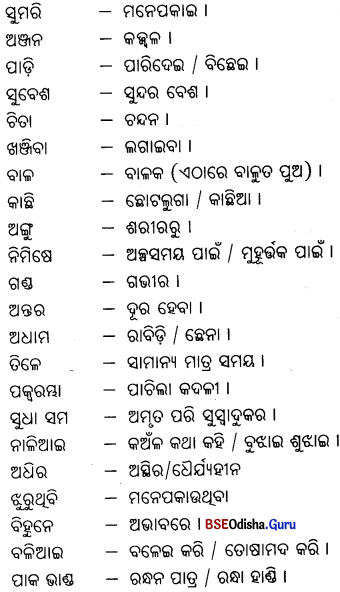
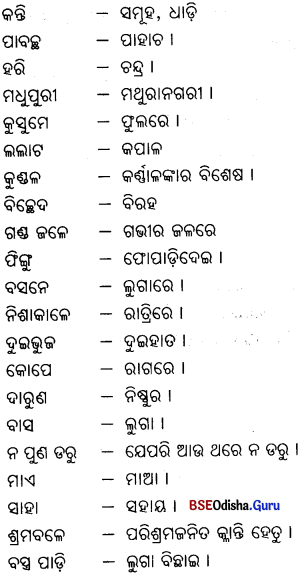
![]()
![]()
![]()
![]()
![]()
![]()
![]()
![]()
![]()
![]()





